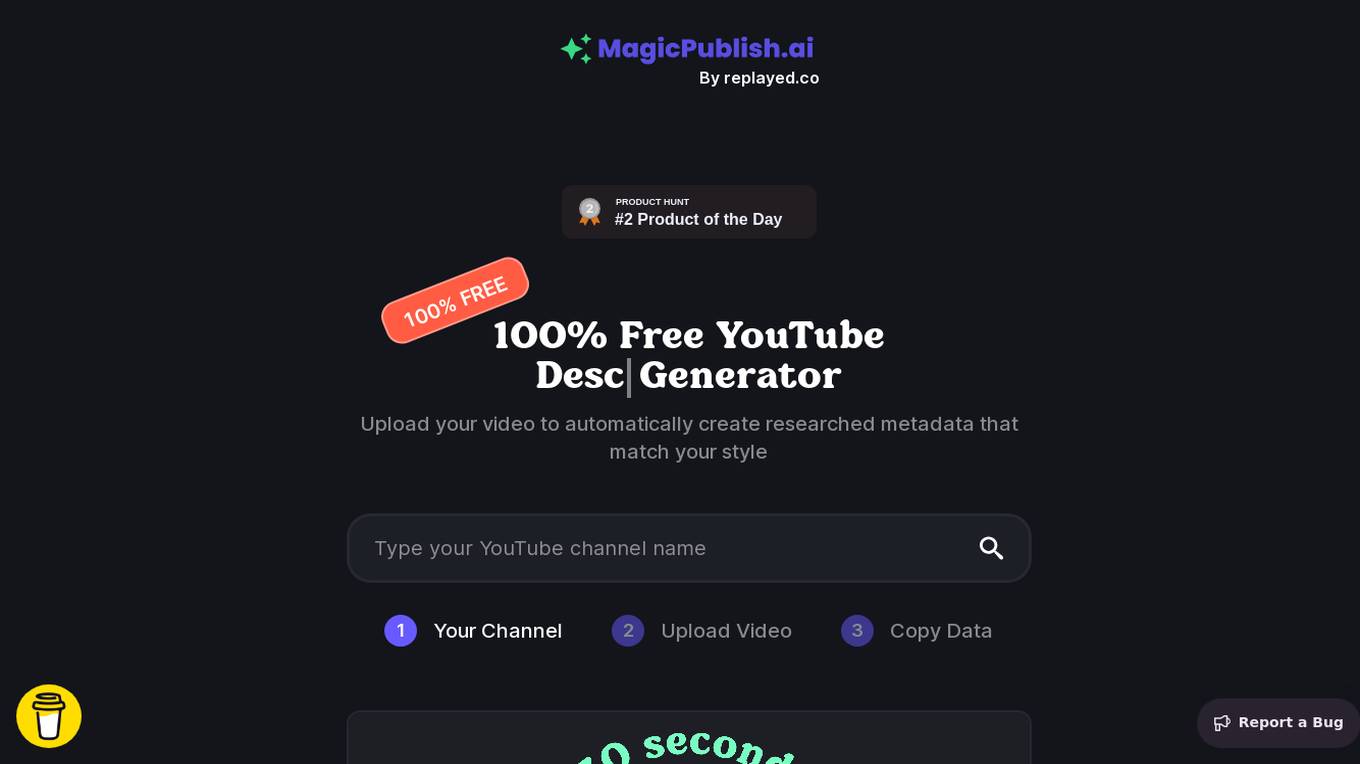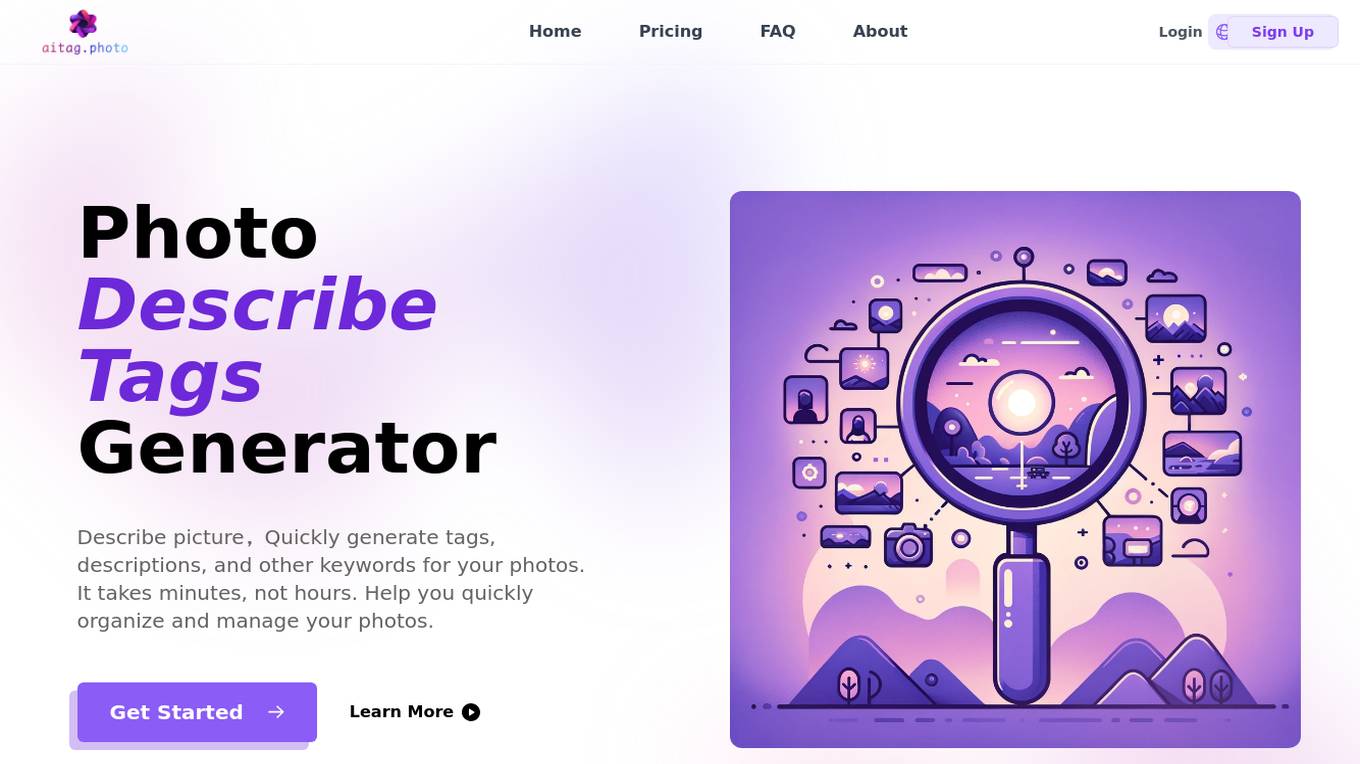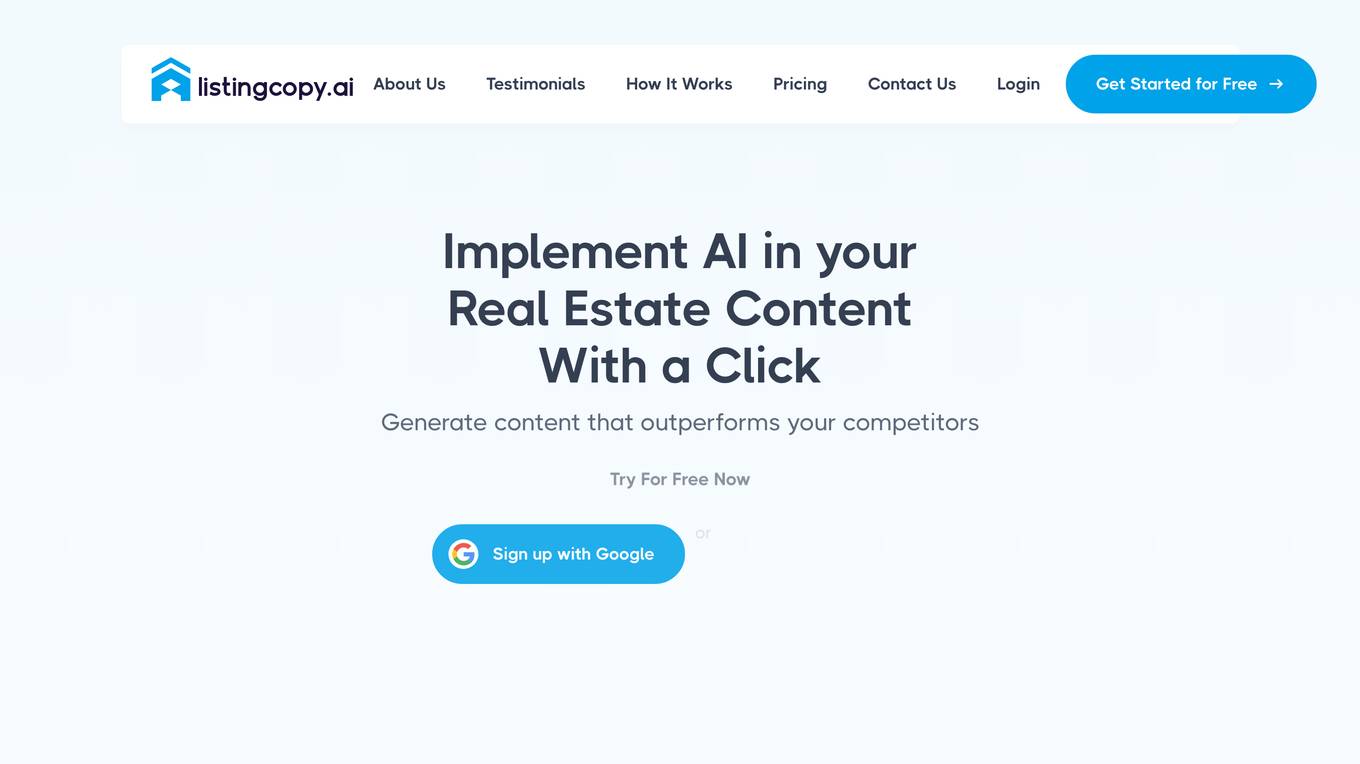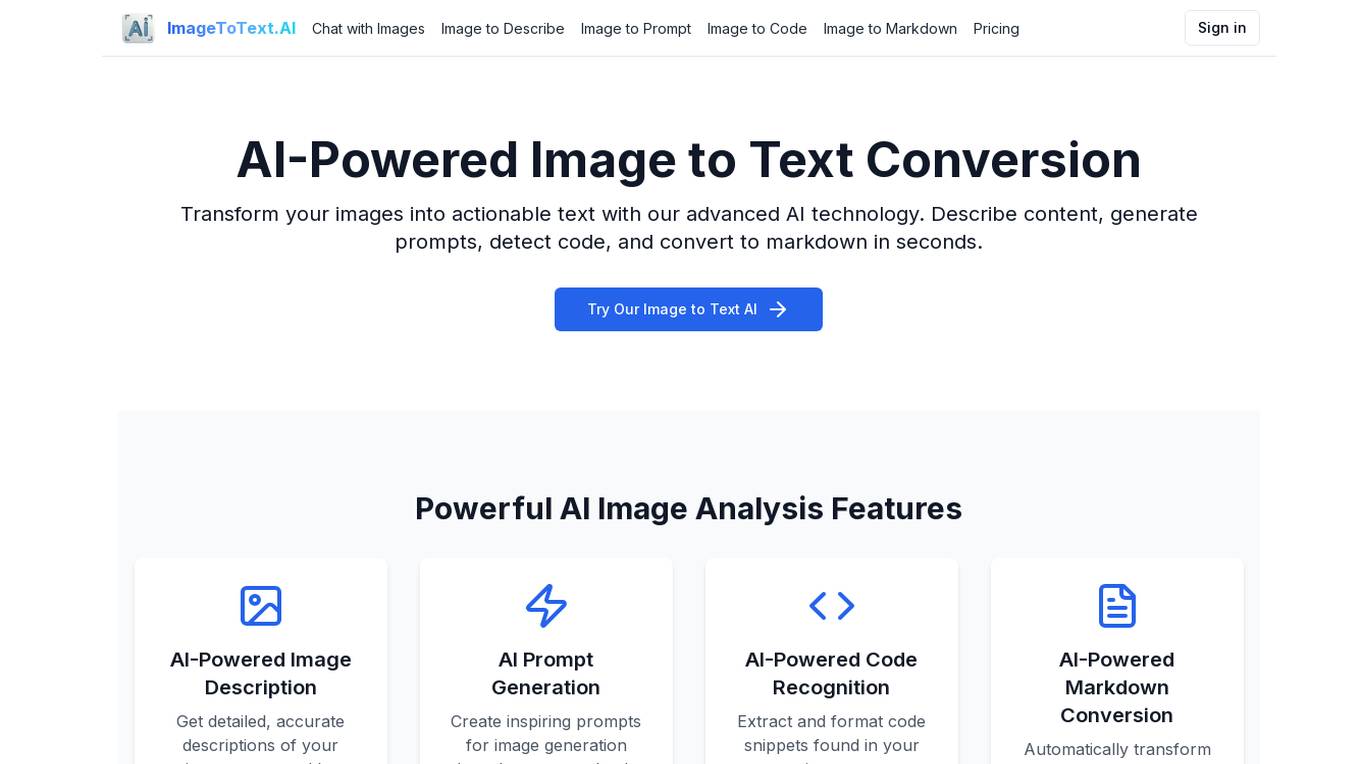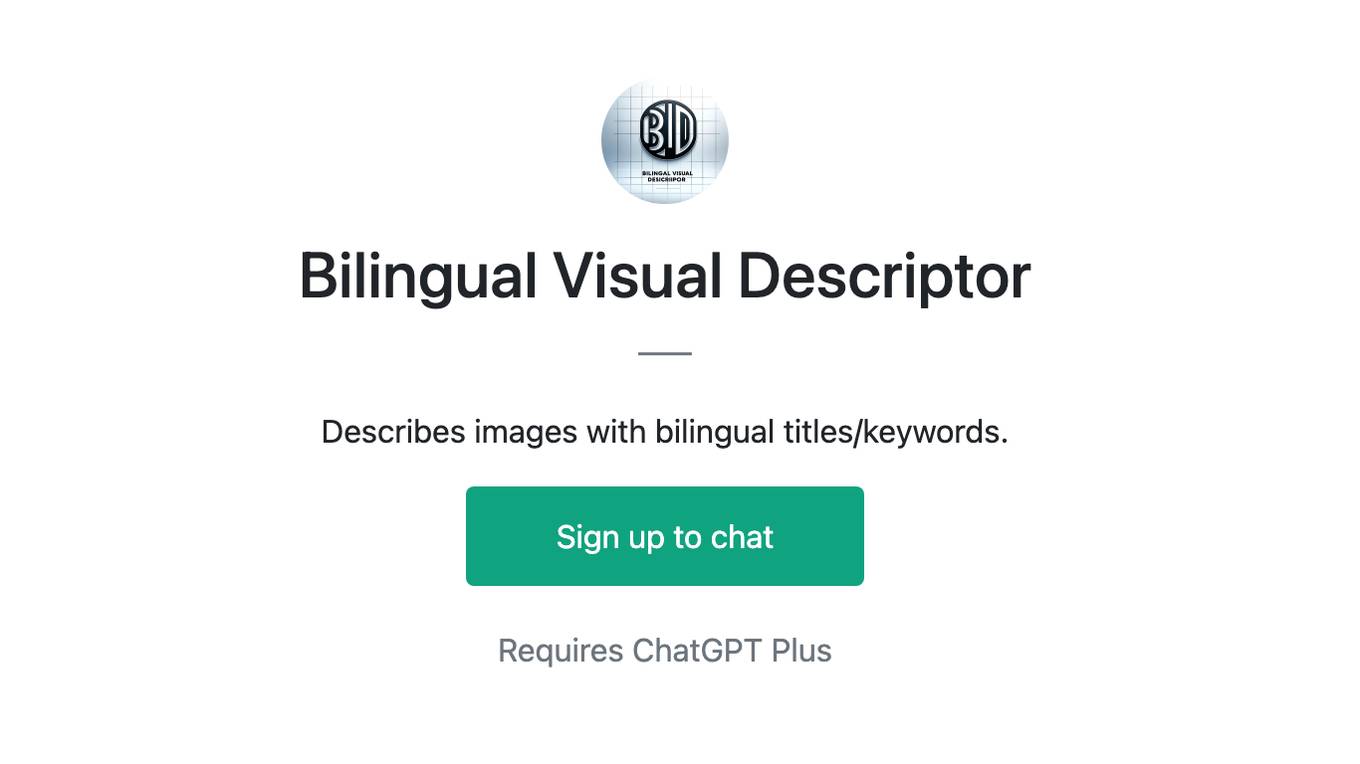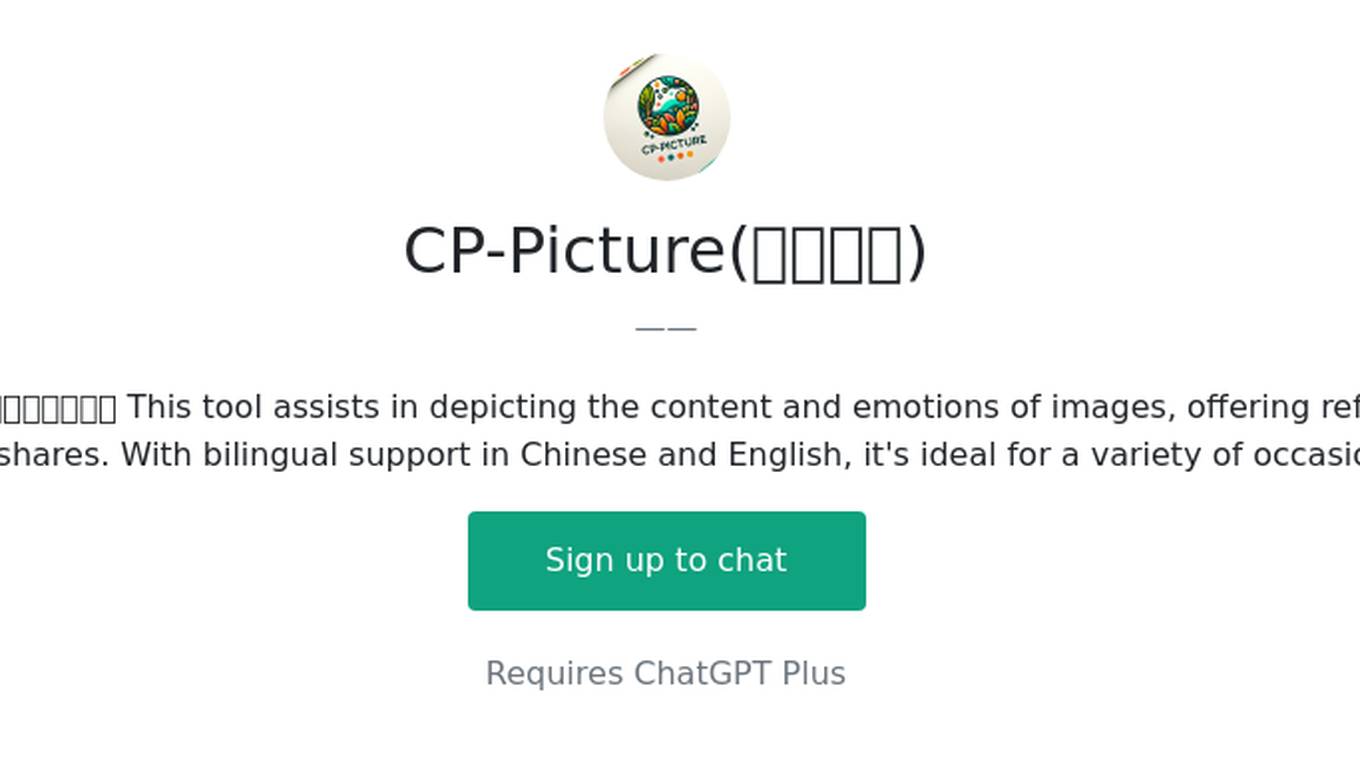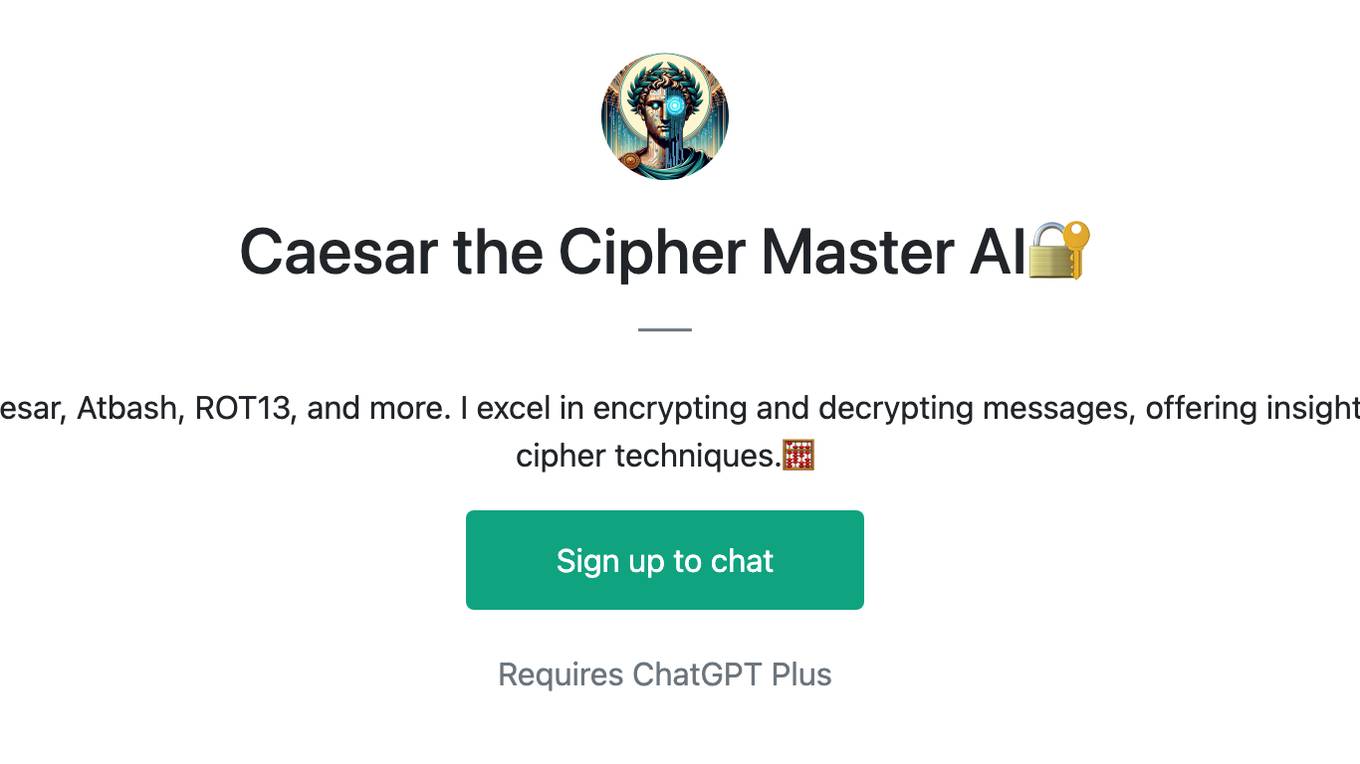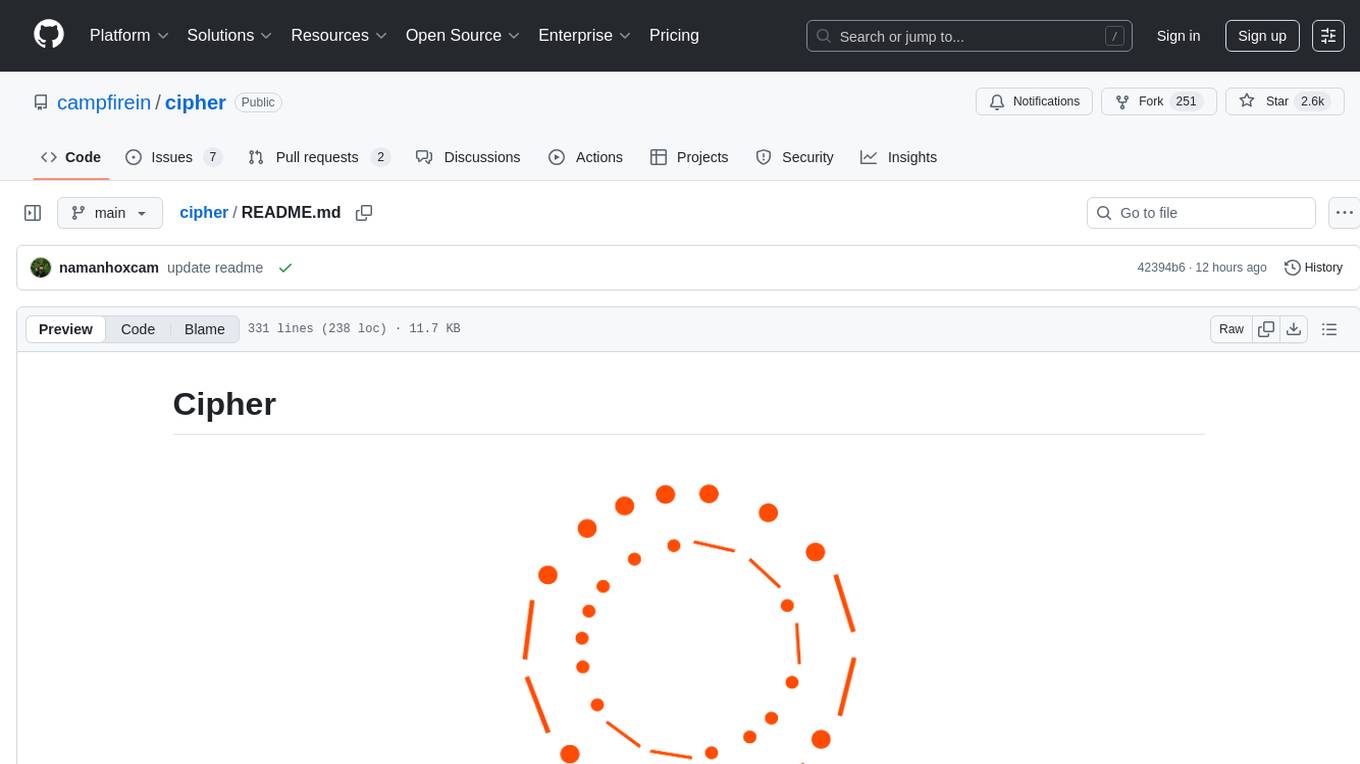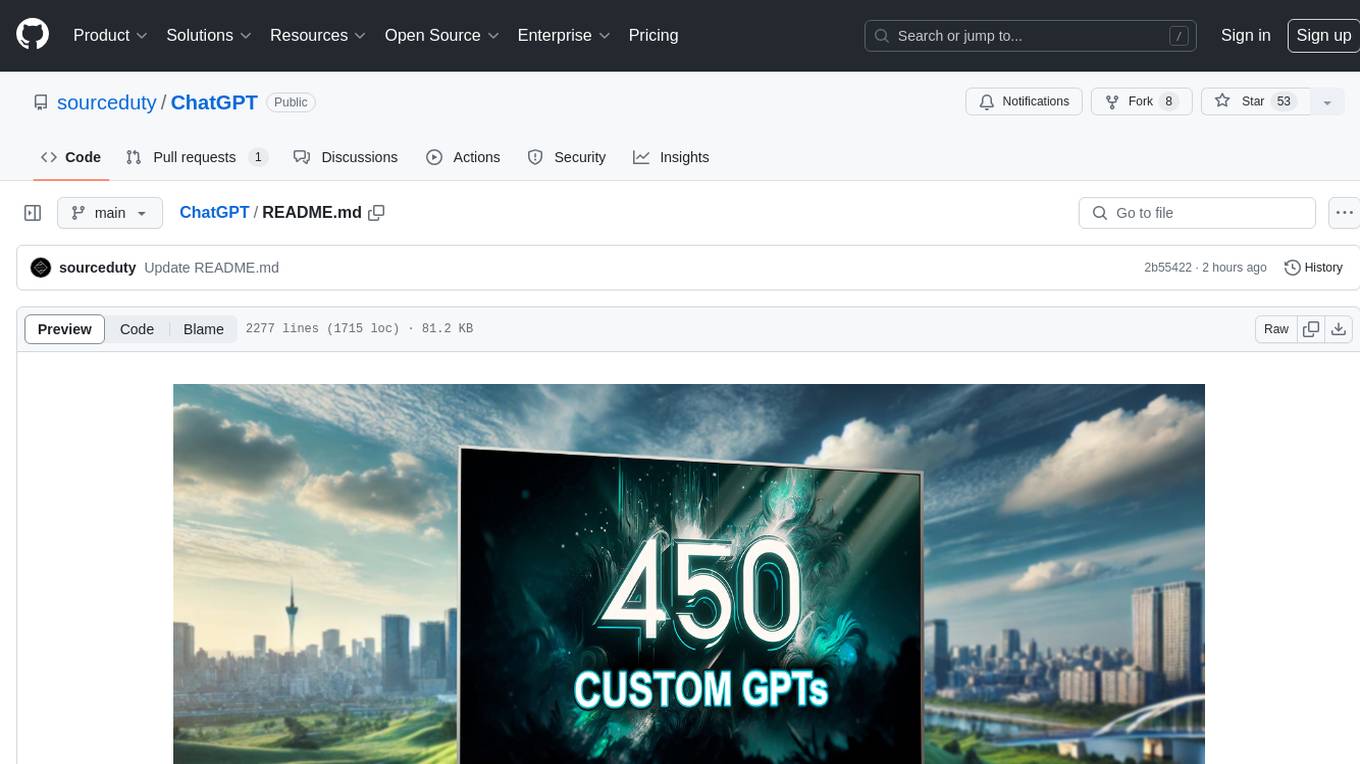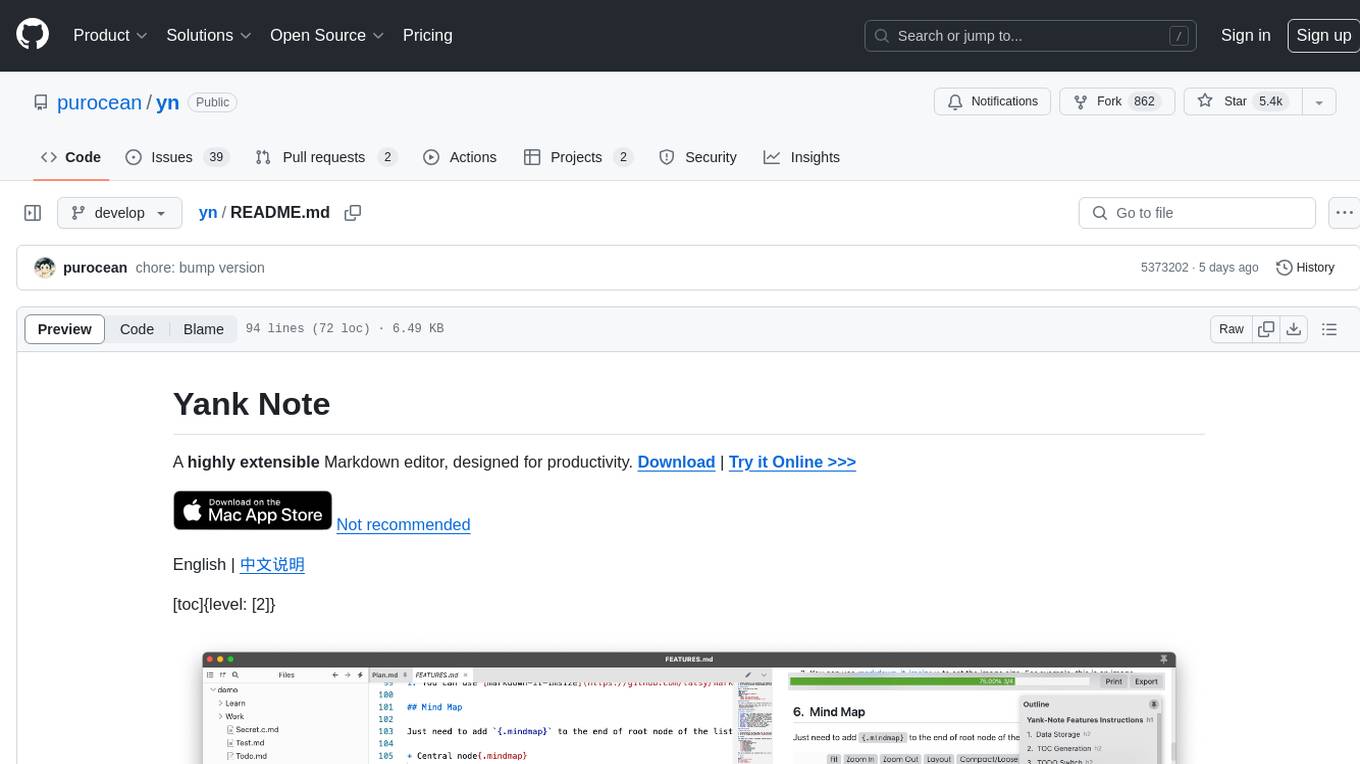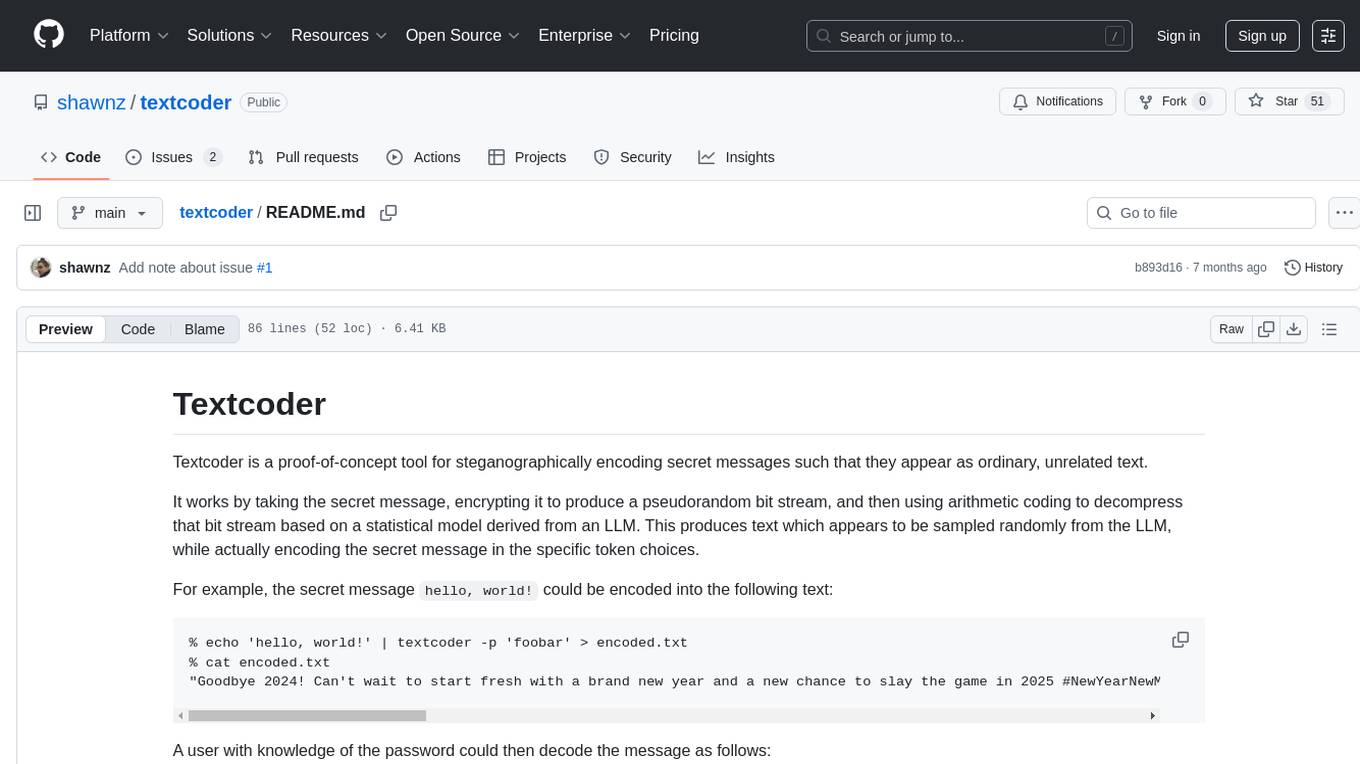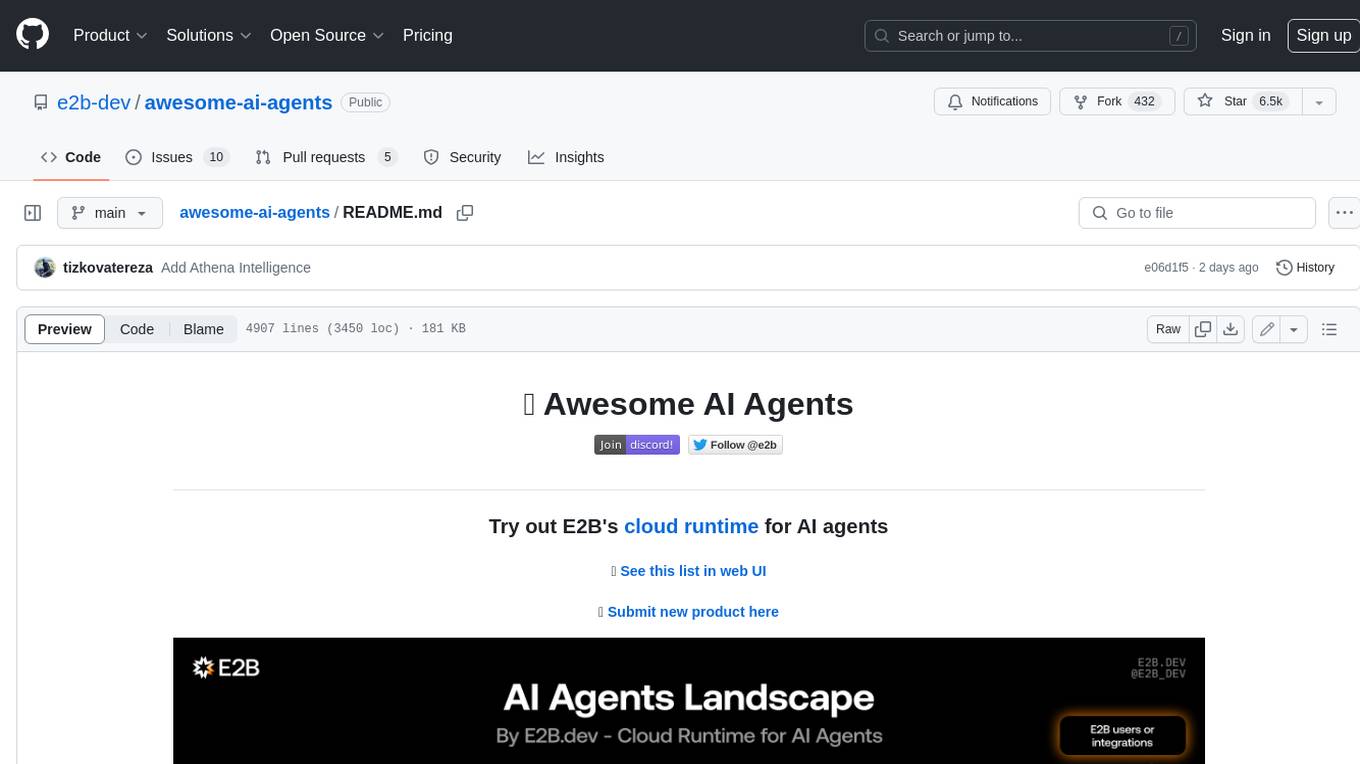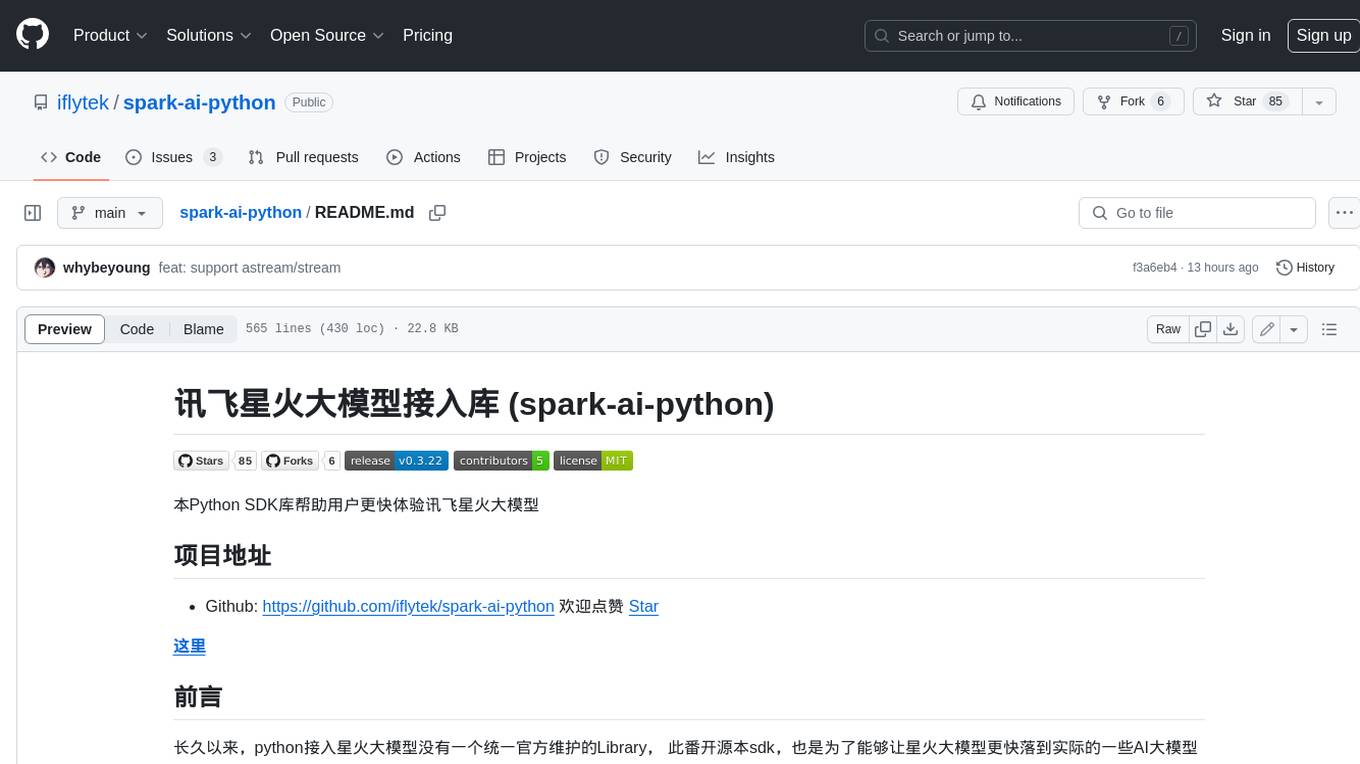AI tools for ai decryption tool
Related Tools:
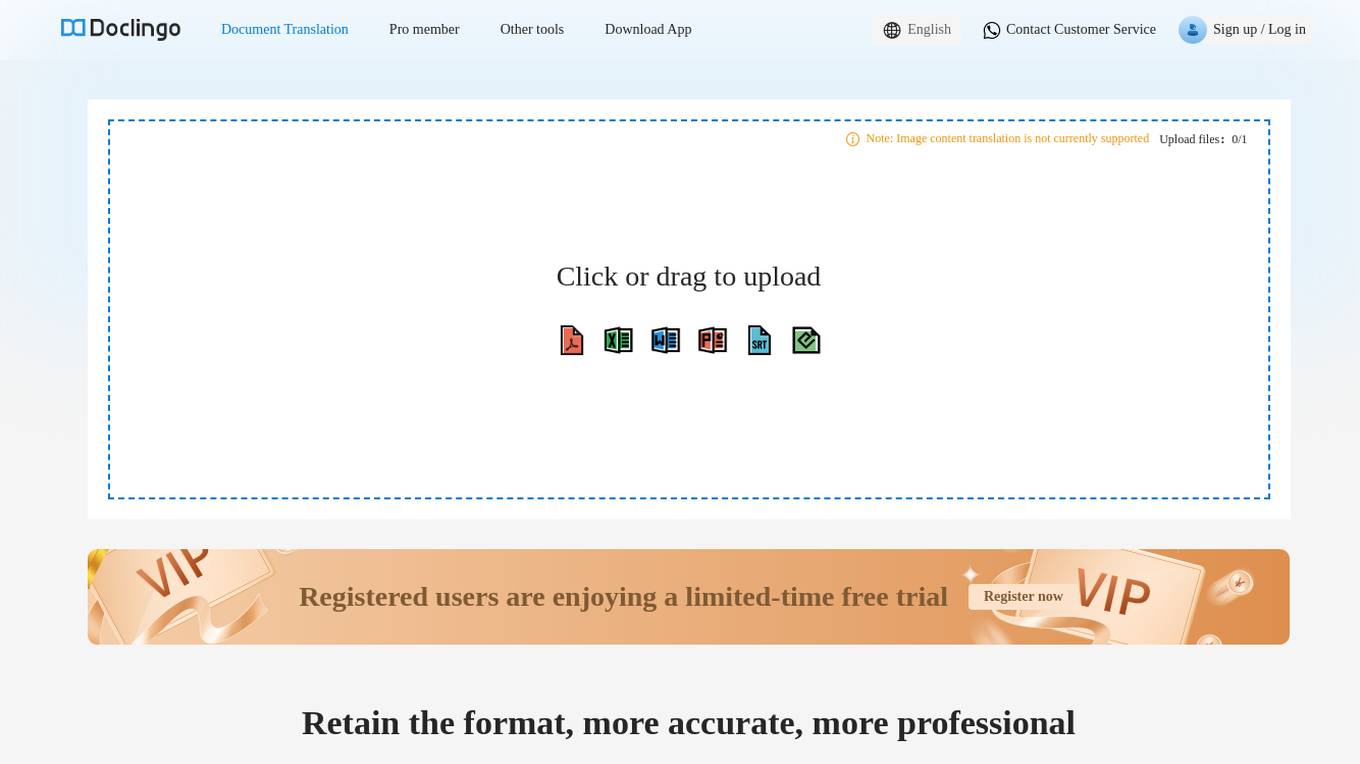
Doclingo
Doclingo is an AI-powered document translation tool that supports translating documents in various formats such as PDF, Word, Excel, PowerPoint, SRT subtitles, ePub ebooks, AR&ZIP packages, and more. It utilizes large language models to provide accurate and professional translations, preserving the original layout of the documents. Users can enjoy a limited-time free trial upon registration, with the option to subscribe for more features. Doclingo aims to offer high-quality translation services through continuous algorithm improvements.

Loupe Recruit
Loupe Recruit is an AI-powered talent assessment platform that helps recruiters and hiring managers assess job descriptions and talent faster and more efficiently. It uses natural language processing and machine learning to analyze job descriptions and identify the key skills and experience required for a role. Loupe Recruit then matches candidates to these requirements, providing recruiters with a ranked list of the most qualified candidates. The platform also includes a variety of tools to help recruiters screen and interview candidates, including video interviewing, skills assessments, and reference checks.
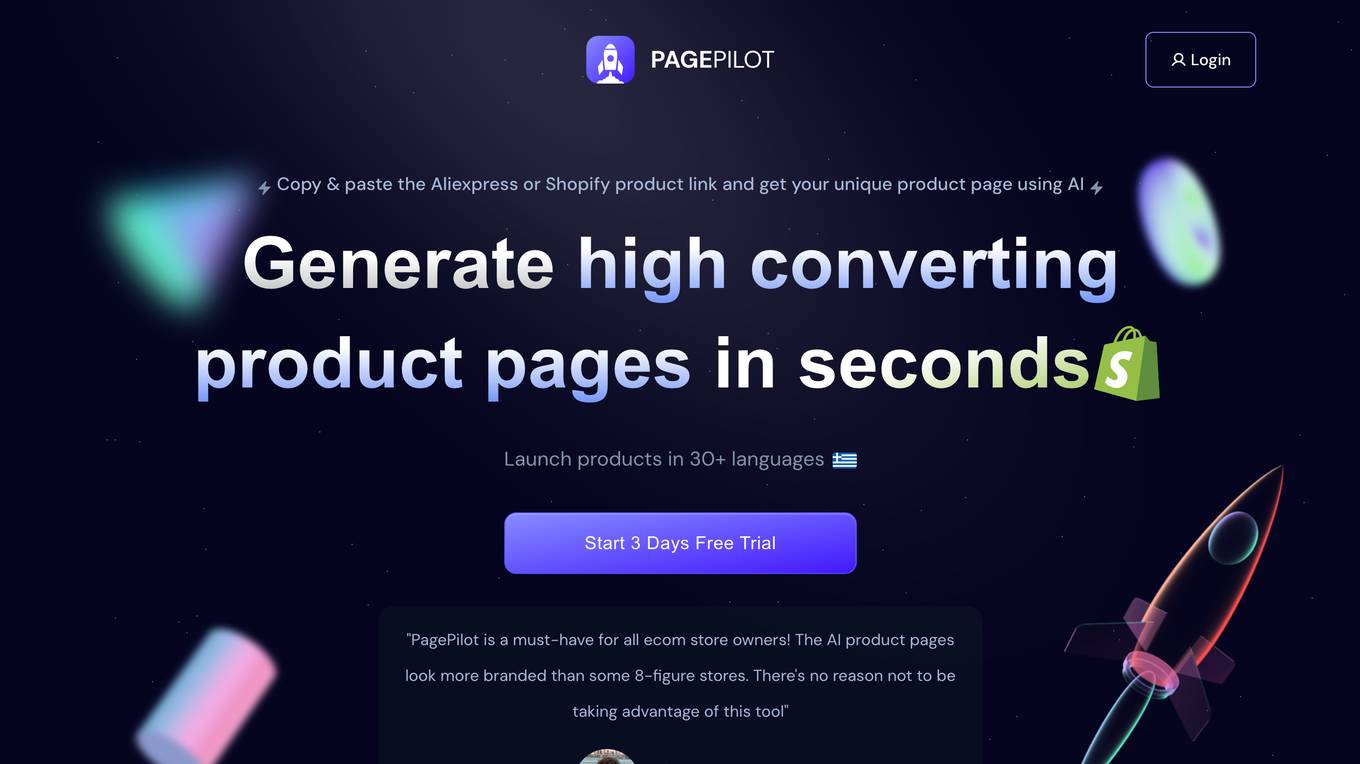
Page Pilot AI
Page Pilot AI is a tool that helps e-commerce store owners create high-converting product pages and ad copy using artificial intelligence. It offers features such as product page generation, ad creative generation, and access to winning products. With Page Pilot AI, users can save time and money by automating the product testing phase and launching products faster.

EasyListing.info
EasyListing.info is a real estate listing property description generator powered by AI technology. It allows users to create high-converting SEO optimized real estate listing descriptions in seconds. Users can input details such as property type, number of rooms, bathrooms, square footage, parking details, and highlights of the property to generate compelling descriptions. The tool offers unlimited generations for users who sign up, saving them valuable time and effort in creating property listings.
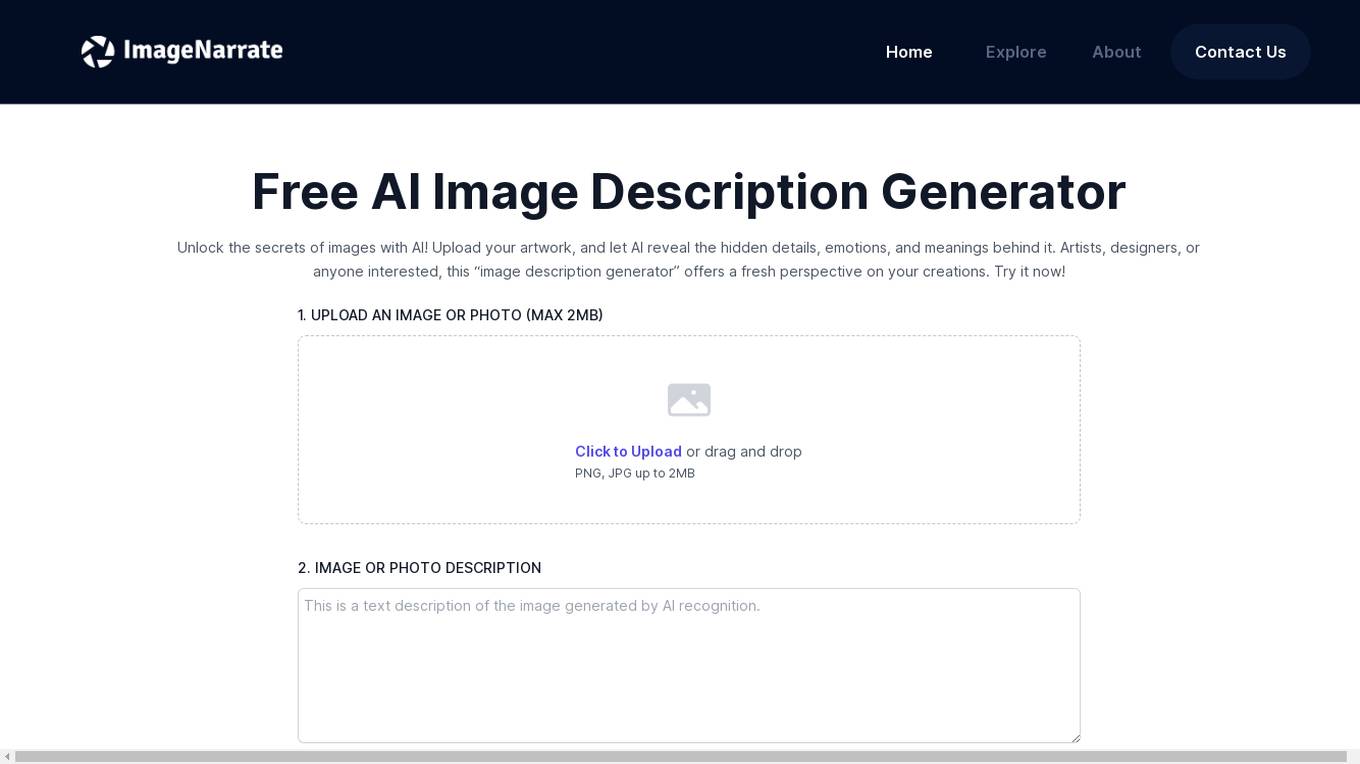
Image Narrate
This free AI image description generator tool allows users to upload an image and receive a detailed description of its contents. The tool utilizes advanced AI algorithms to analyze the image's elements, including color, shape, and texture, to generate a comprehensive description that captures the hidden meanings and emotions conveyed by the image. The tool is particularly useful for artists, designers, and anyone interested in gaining a deeper understanding of their own creations or exploring the hidden narratives within images.

Airbnb Generator
Airbnb Generator is an AI tool designed to help Airbnb hosts create compelling property descriptions quickly and effortlessly. By utilizing a blend of AI sophistication and personal touch, the tool generates unique and engaging narratives that showcase the best features of the property. Hosts can save time on drafting and editing, allowing them to focus on delivering exceptional guest experiences. The tool ensures accuracy and precision in crafting descriptions that resonate with clarity and appeal, catering to a wide range of property types from cozy studios to grand villas.

AI Toolbox
The website offers a variety of AI-powered tools and applications designed to assist users in different tasks such as content creation, image description, learning acceleration, feedback generation, and more. Users can access tools like 'War Room' for collaborative problem-solving, 'Describe Image' for image description, 'Mind Hack' for accelerated learning, 'Negative Nancy' for negative feedback, 'Random Person' for generating random individuals, and many more. The platform aims to provide innovative solutions through AI technology to enhance user experience and productivity.
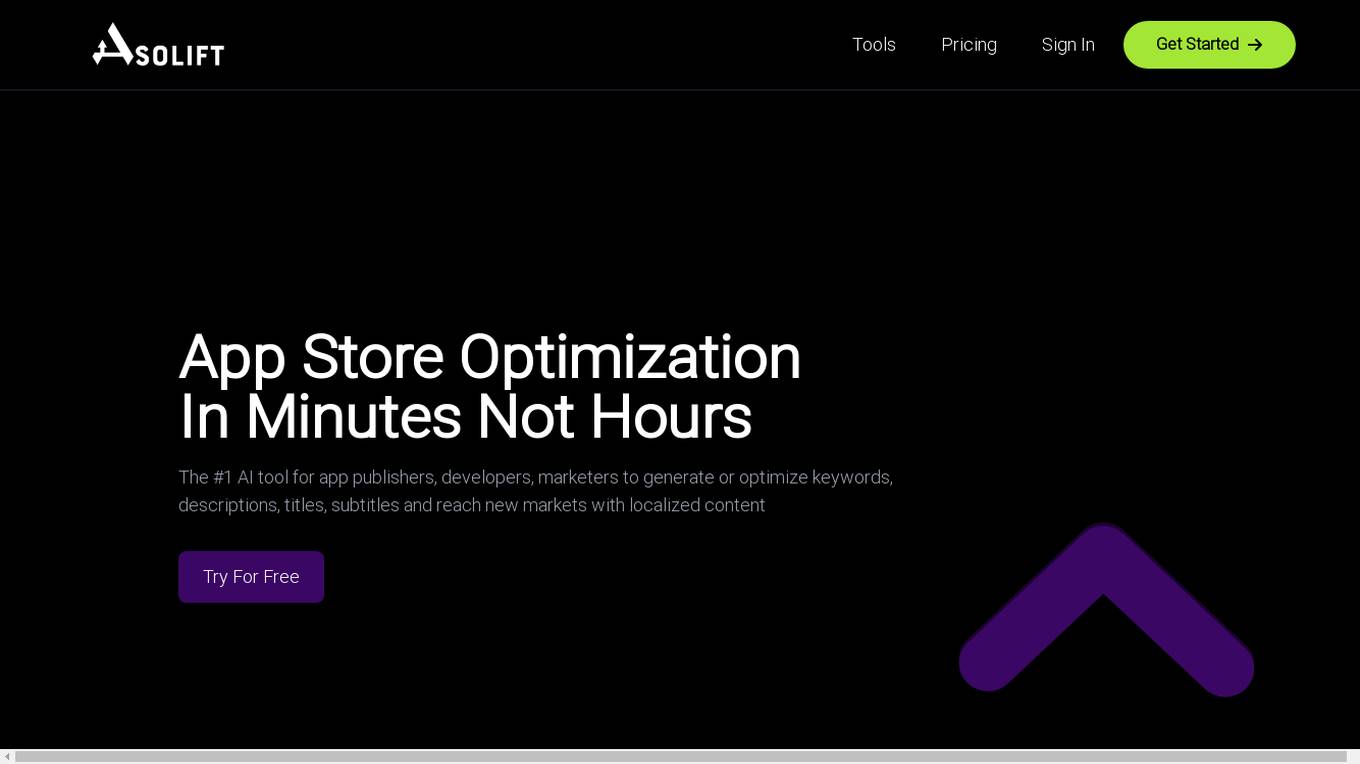
AsoLift
AsoLift is the #1 AI tool for app publishers, developers, and marketers to optimize keywords, descriptions, titles, subtitles, and localize content in app store optimization. It offers a suite of tools powered by AI technology to boost app downloads, improve app visibility, and increase global reach. Users can easily generate or optimize various elements of their app listings with the help of AI algorithms, leading to enhanced app store rankings and revenue. AsoLift simplifies the process of finding impactful keywords, crafting ASO-friendly descriptions, and setting optimized prices, giving users a competitive edge in the app market.
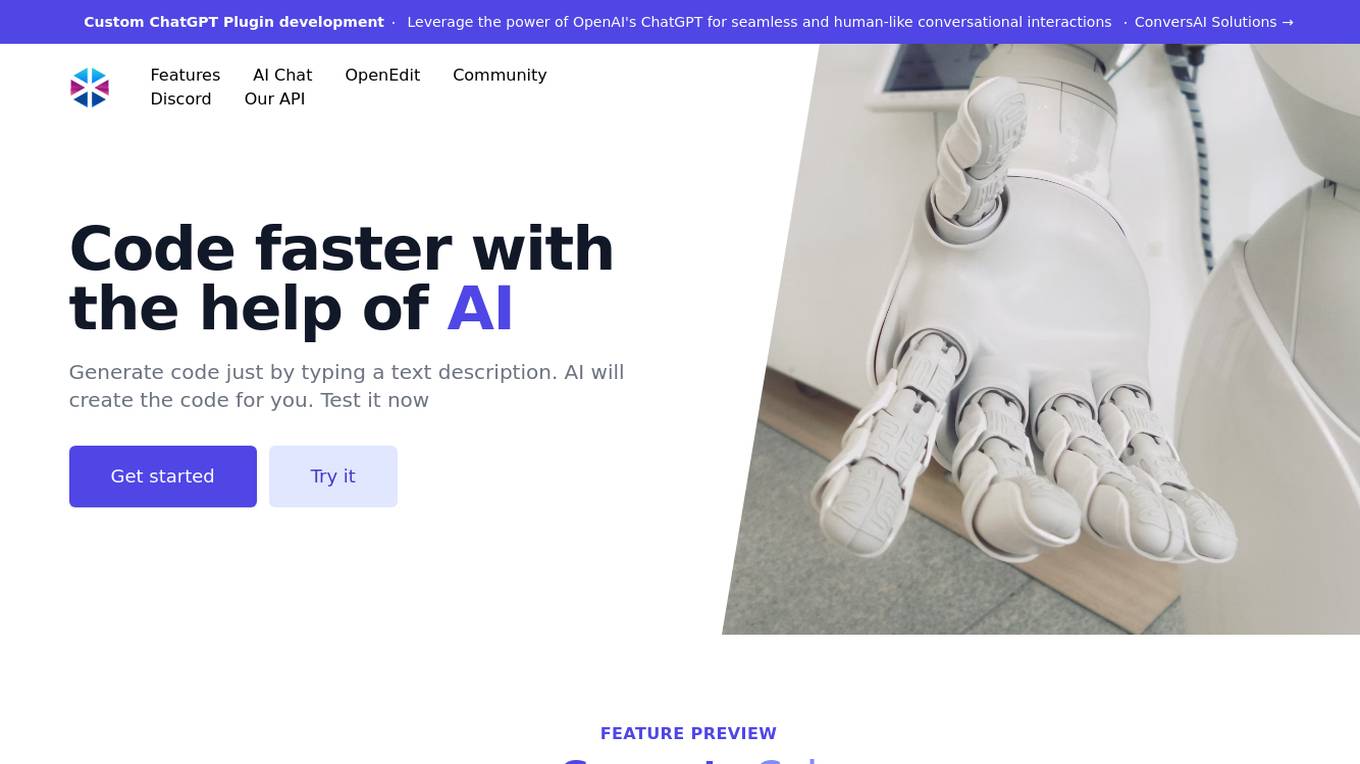
Programming Helper
Programming Helper is a tool that helps you code faster with the help of AI. It can generate code, test code, and explain code. It also has a wide range of other features, such as a function from description, text description to SQL command, and code to explanation. Programming Helper is a valuable tool for any programmer, regardless of their skill level.
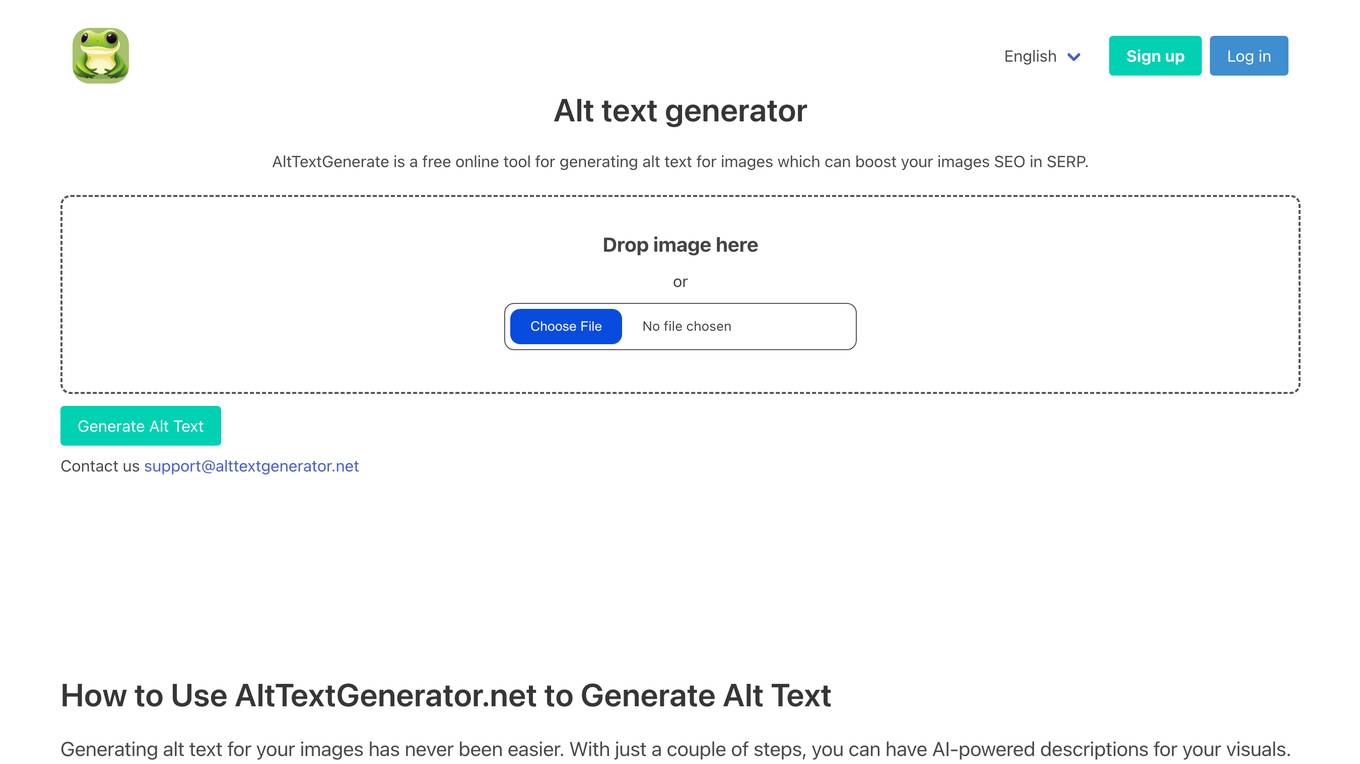
AltTextGenerate
AltTextGenerate is a free online tool for generating alt text for images, enhancing SEO and accessibility. It uses AI-powered descriptions to provide suitable alt text for visuals. The tool leverages Convolutional Neural Networks (CNNs) and Recurrent Neural Networks (RNNs) to understand image content and generate descriptive text. AltTextGenerate offers a comprehensive solution for generating alt text across various platforms, including WordPress, Shopify, and CMSs. Users can benefit from SEO advantages, improved website ranking, and enhanced user experience through descriptive alt text.

AI Rewriter GPT
A tool to distinguish between human and AI-generated text, offering improvements.

Artist Ai
Merging art, code, and AI with feedback, customization, and image-to-description. Crafting diverse art prompts in multiple styles, from 3D to oil paintings. With inbuilt code to art generator. Try Now!
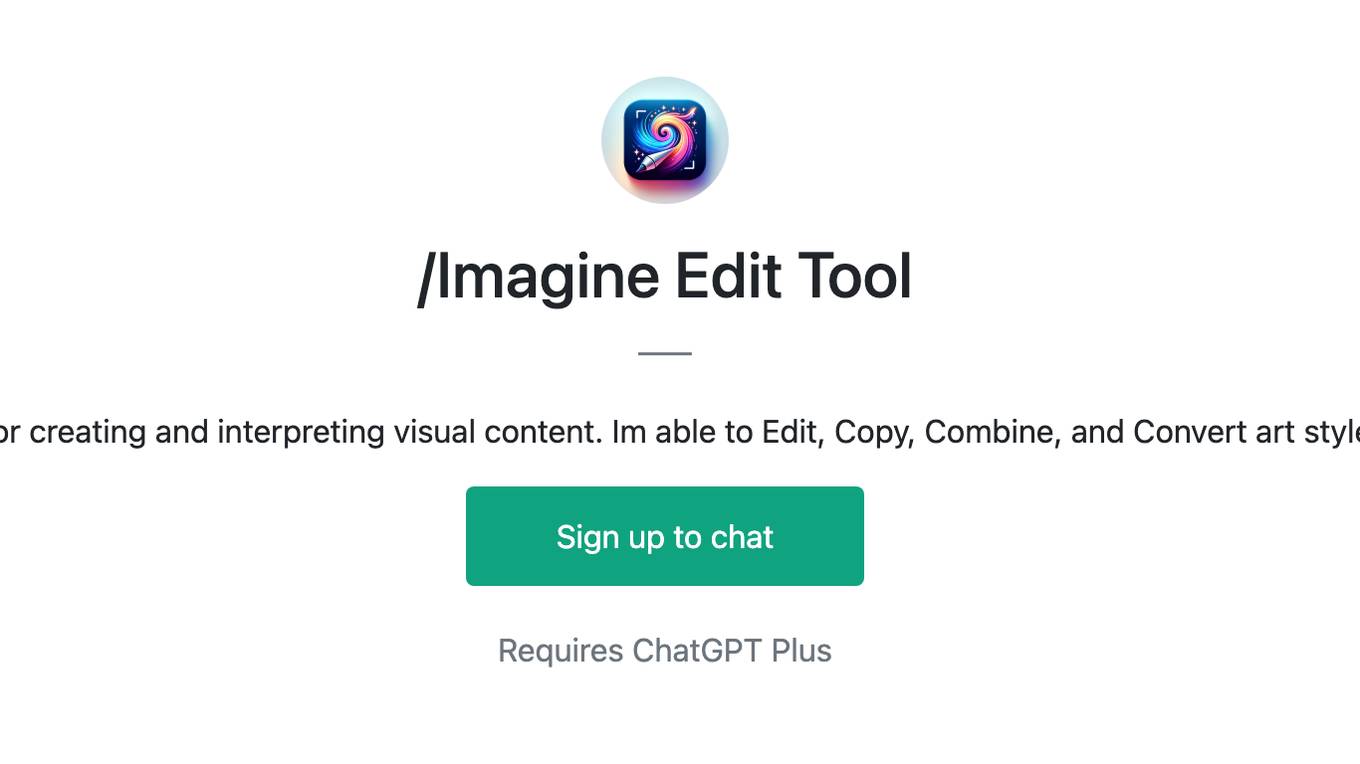
/Imagine Edit Tool
Advanced AI for creating and interpreting visual content. Im able to Edit, Copy, Combine, and Convert art styles/mediums.
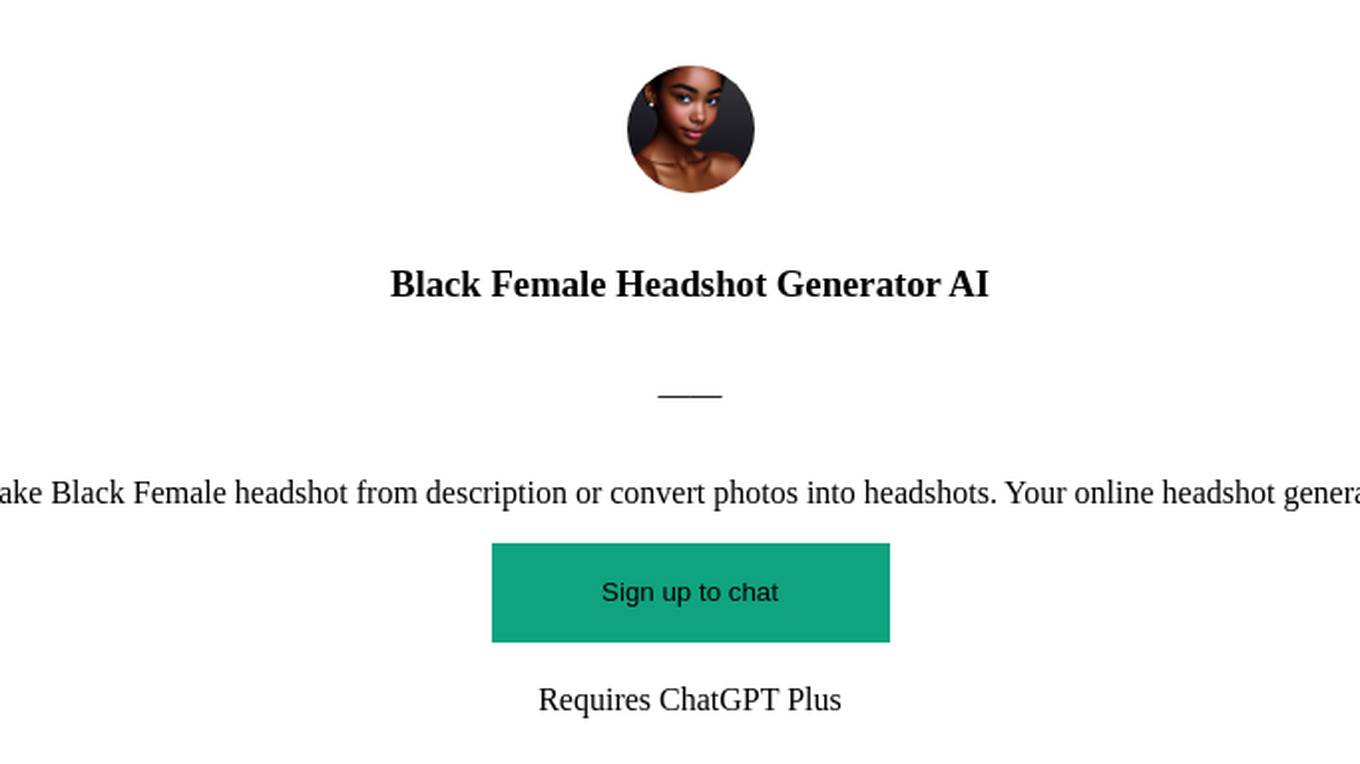
Black Female Headshot Generator AI
Make Black Female headshot from description or convert photos into headshots. Your online headshot generator.

Stealth Rewriter
I rephrase text to make it distinct yet retain its essence, style, and tone.
PragmaPilot - A Generative AI Use Case Generator
Show me your job description or just describe what you do professionally, and I'll help you identify high value use cases for AI in your day-to-day work. I'll also coach you on simple techniques to get the best out of ChatGPT.
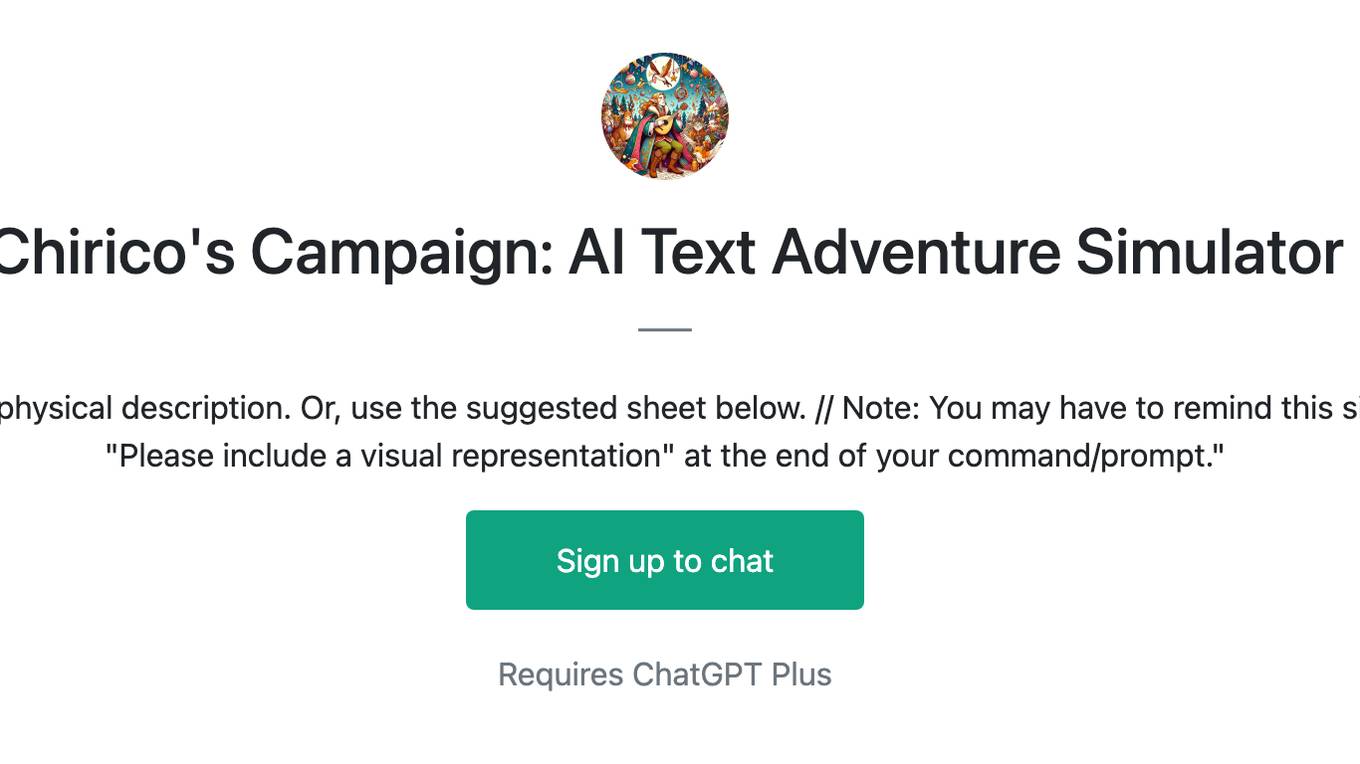
Chirico's Campaign: AI Text Adventure Simulator
Optional: Insert your character sheet and physical description. Or, use the suggested sheet below. // Note: You may have to remind this simulator to generate visuals by inserting "Please include a visual representation" at the end of your command/prompt."
Creating structured courses by CourseGenie.ai
Provide a Topic and an Audience and we'll help you create 1. Course description 2. Outline 3. Learning Outcomes 5. Skills-Knowledge-Attitude objectives 5. Key points per lesson
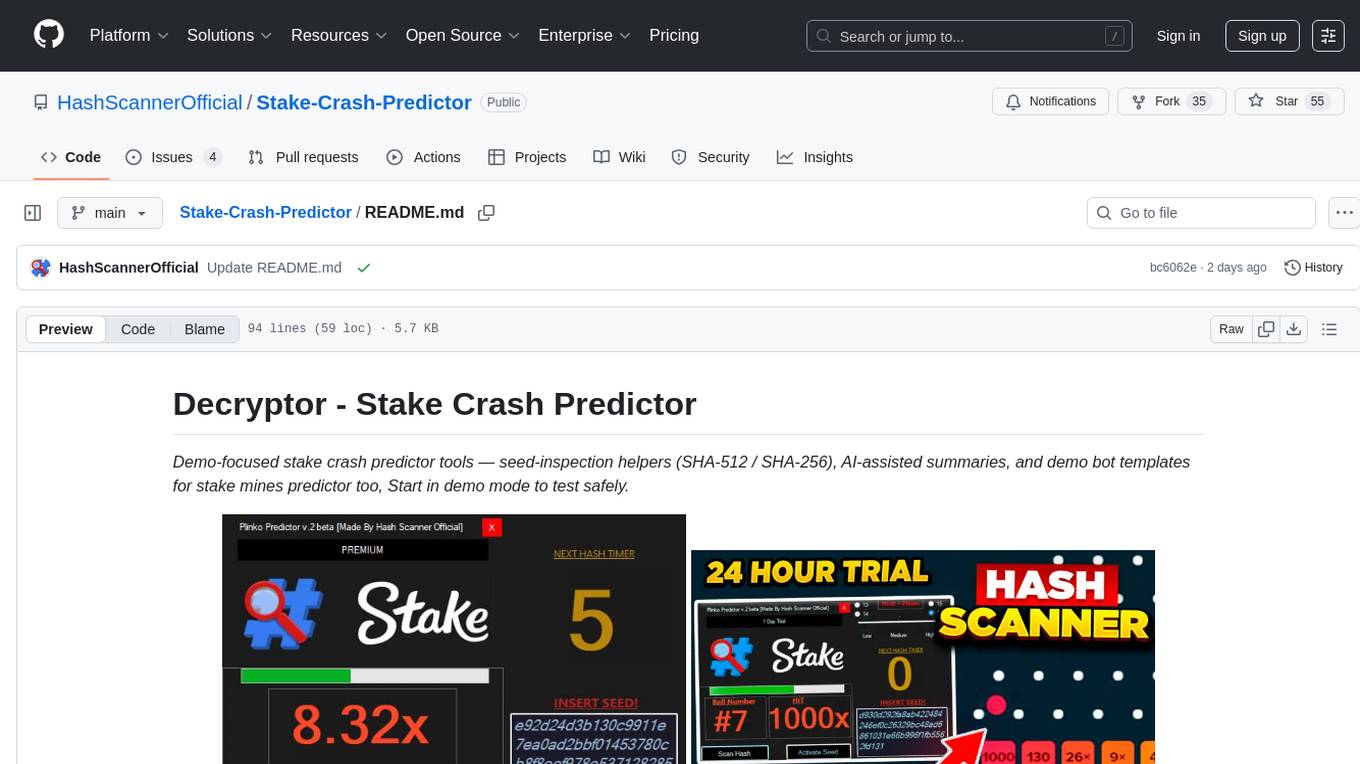
Stake-Crash-Predictor
The Stake Crash Predictor is a demo-focused toolkit that combines statistical analysis, decryption tools, and AI-assisted summaries to help users study rounds on Stake.us. It includes features like real-time prediction accuracy, AI summaries, decryption tools, and demo bot templates. Users can install the tool by downloading the ZIP file, run it in demo mode to explore crash predictor outputs, and use the server seed hash decrypt helper for educational purposes. The tool is designed for Stake.us and focuses on stake mines predictor and stake predictor workflows.
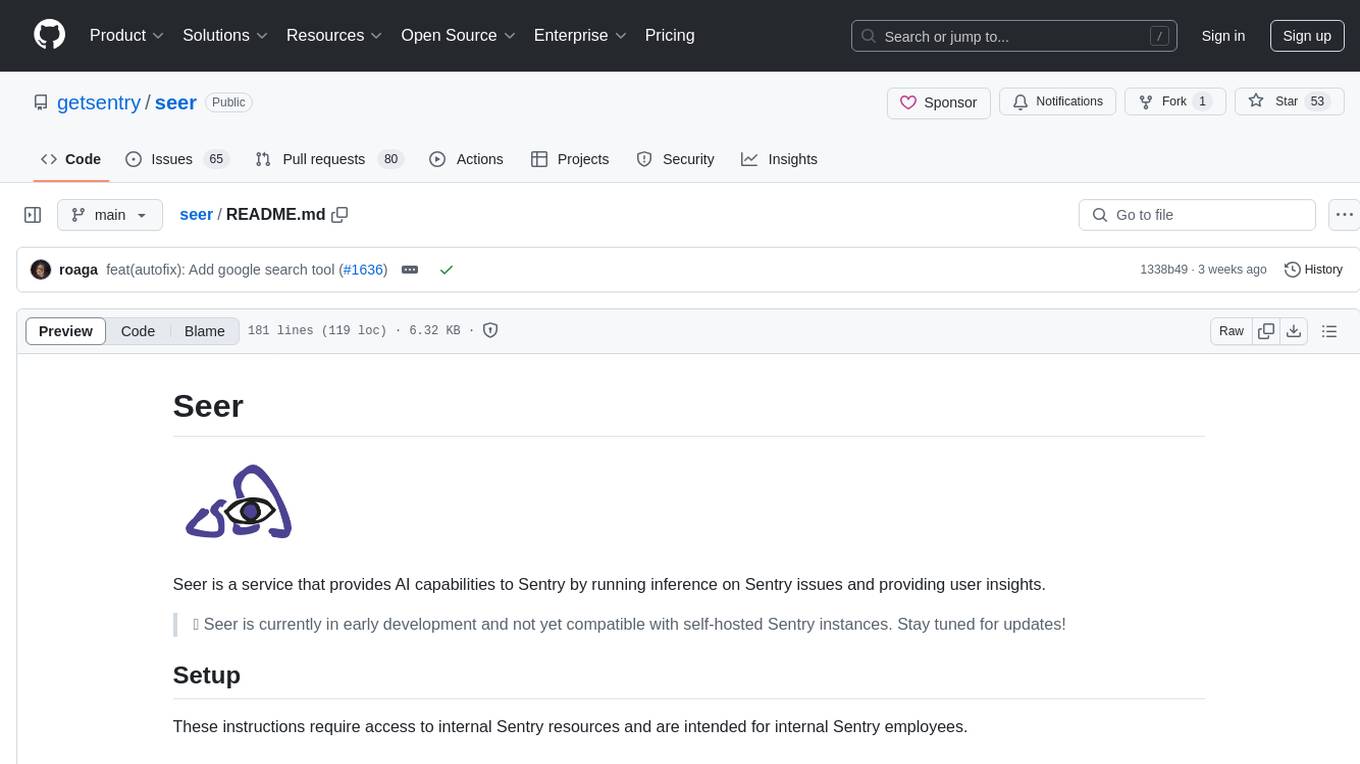
seer
Seer is a service that provides AI capabilities to Sentry by running inference on Sentry issues and providing user insights. It is currently in early development and not yet compatible with self-hosted Sentry instances. The tool requires access to internal Sentry resources and is intended for internal Sentry employees. Users can set up the environment, download model artifacts, integrate with local Sentry, run evaluations for Autofix AI agent, and deploy to a sandbox staging environment. Development commands include applying database migrations, creating new migrations, running tests, and more. The tool also supports VCRs for recording and replaying HTTP requests.
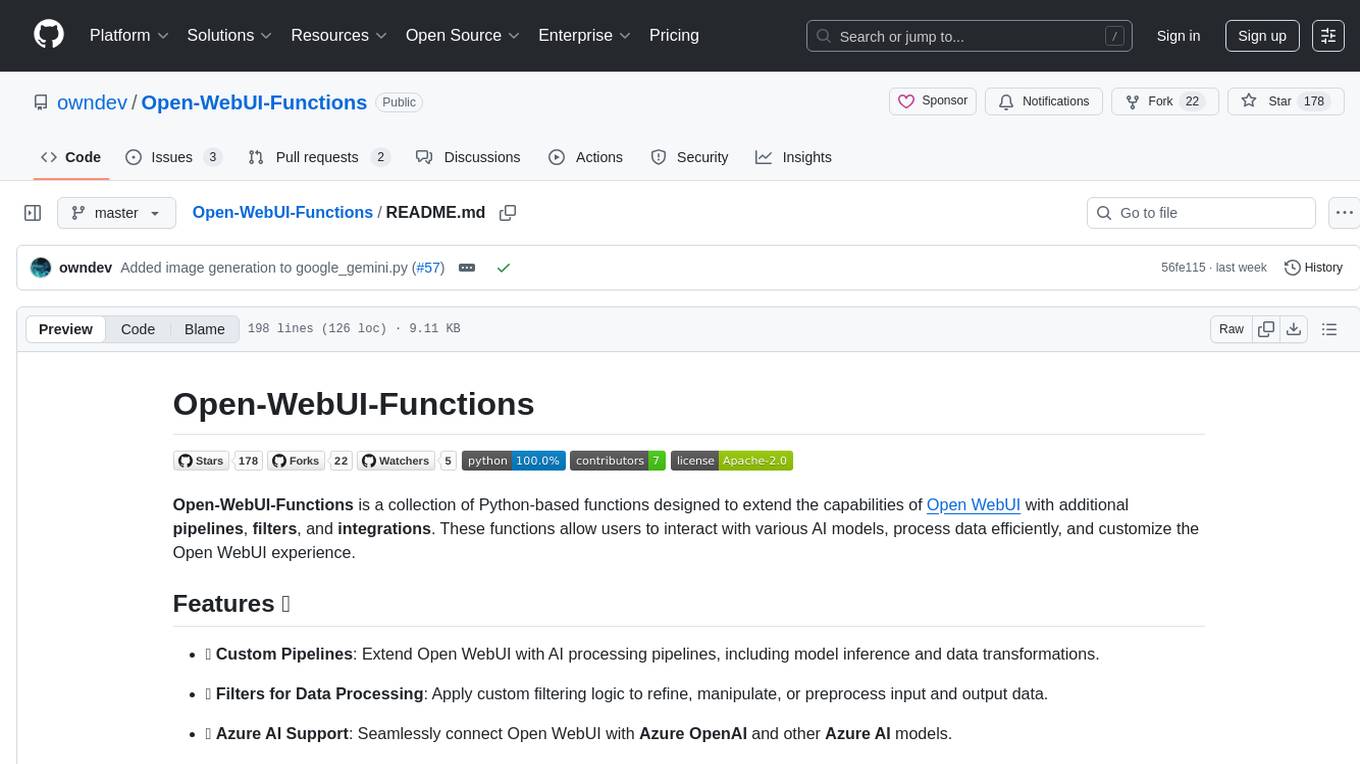
Open-WebUI-Functions
Open-WebUI-Functions is a collection of Python-based functions that extend Open WebUI with custom pipelines, filters, and integrations. Users can interact with AI models, process data efficiently, and customize the Open WebUI experience. It includes features like custom pipelines, data processing filters, Azure AI support, N8N workflow integration, flexible configuration, secure API key management, and support for both streaming and non-streaming processing. The functions require an active Open WebUI instance, may need external AI services like Azure AI, and admin access for installation. Security features include automatic encryption of sensitive information like API keys. Pipelines include Azure AI Foundry, N8N, Infomaniak, and Google Gemini. Filters like Time Token Tracker measure response time and token usage. Integrations with Azure AI, N8N, Infomaniak, and Google are supported. Contributions are welcome, and the project is licensed under Apache License 2.0.
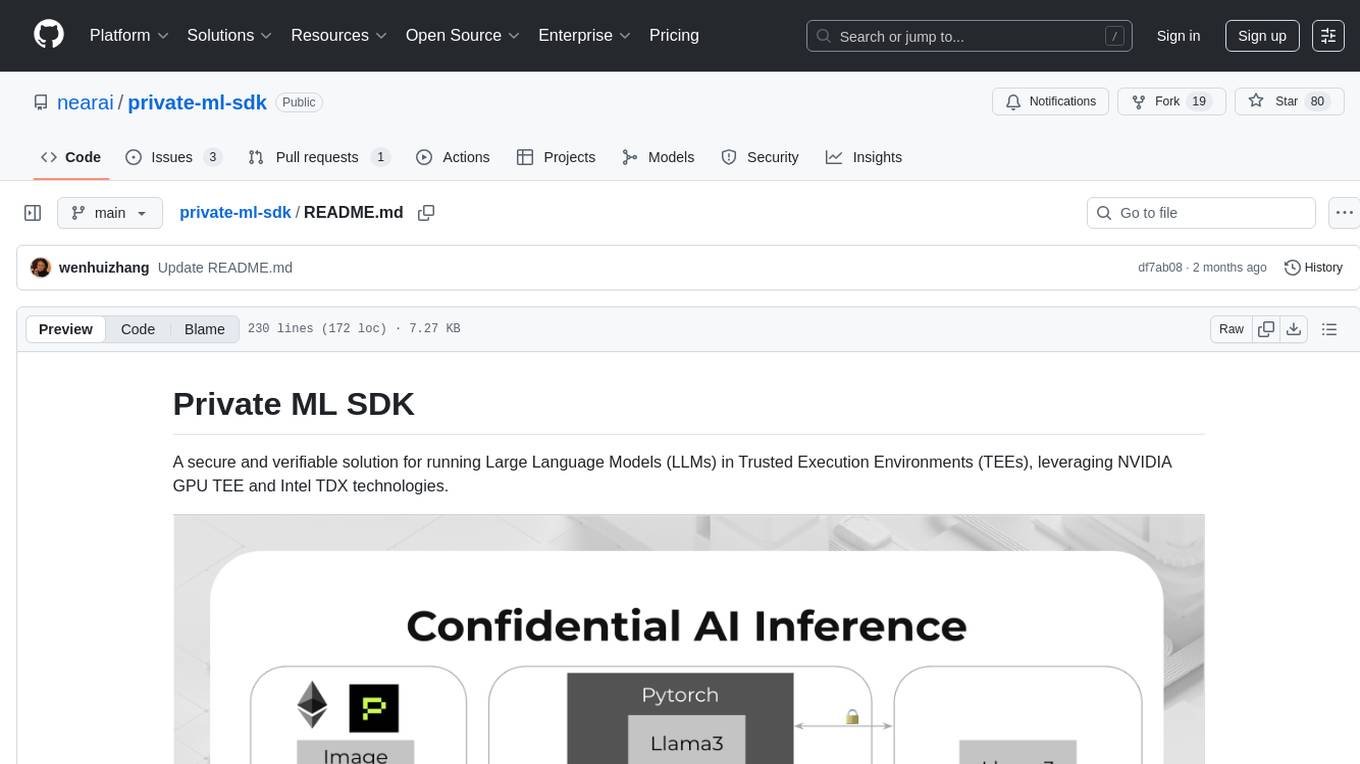
private-ml-sdk
Private ML SDK is a secure solution for running Large Language Models (LLMs) in Trusted Execution Environments (TEEs) using NVIDIA GPU TEE and Intel TDX technologies. It provides a tamper-proof data processing environment with secure execution, open-source builds, and nearly native speed performance. The system includes components like Secure Compute Environment, Remote Attestation, Secure Communication, and Key Management Service (KMS). Users can build TDX guest images, run Local KMS, and TDX guest images on TDX host machines with Nvidia GPUs. The SDK offers verifiable execution results and high performance for LLM workloads.

litdata
LitData is a tool designed for blazingly fast, distributed streaming of training data from any cloud storage. It allows users to transform and optimize data in cloud storage environments efficiently and intuitively, supporting various data types like images, text, video, audio, geo-spatial, and multimodal data. LitData integrates smoothly with frameworks such as LitGPT and PyTorch, enabling seamless streaming of data to multiple machines. Key features include multi-GPU/multi-node support, easy data mixing, pause & resume functionality, support for profiling, memory footprint reduction, cache size configuration, and on-prem optimizations. The tool also provides benchmarks for measuring streaming speed and conversion efficiency, along with runnable templates for different data types. LitData enables infinite cloud data processing by utilizing the Lightning.ai platform to scale data processing with optimized machines.

nyxtext
Nyxtext is a text editor built using Python, featuring Custom Tkinter with the Catppuccin color scheme and glassmorphic design. It follows a modular approach with each element organized into separate files for clarity and maintainability. NyxText is not just a text editor but also an AI-powered desktop application for creatives, developers, and students.
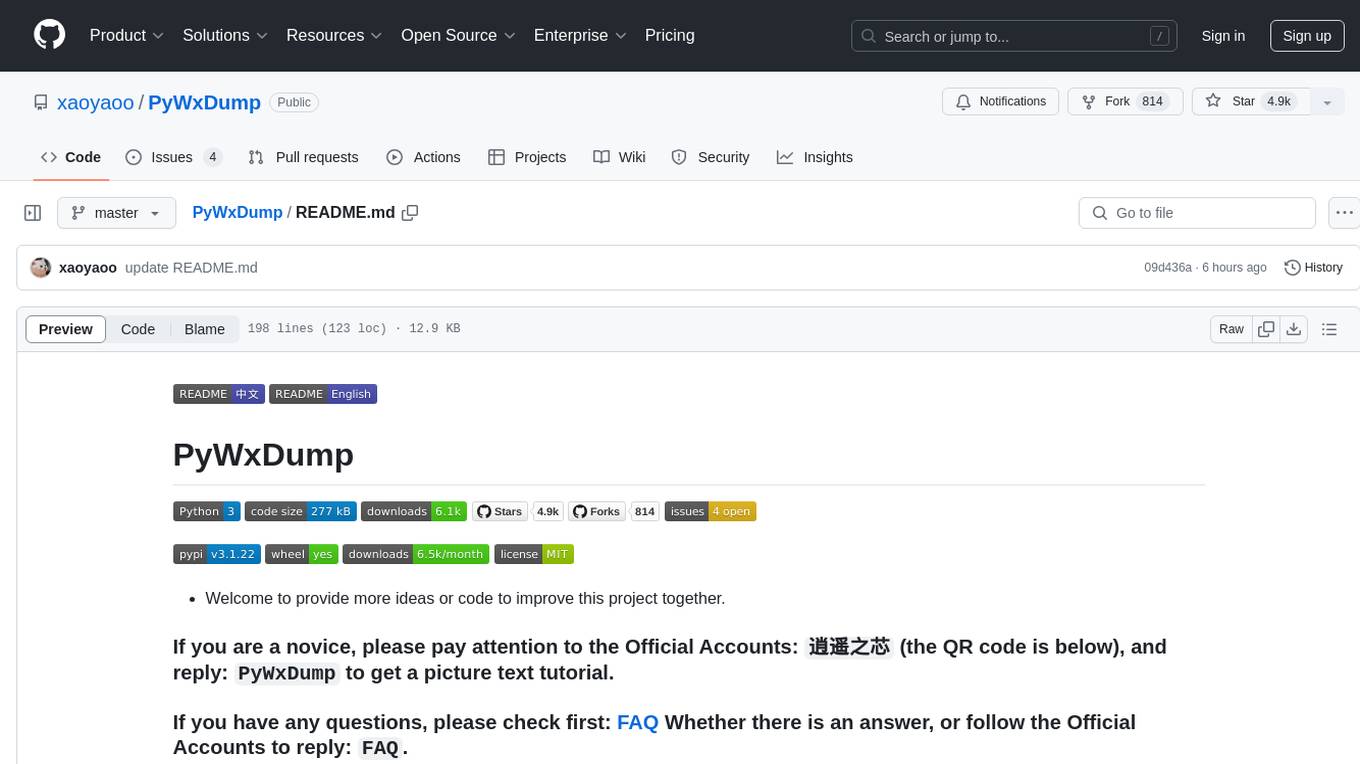
PyWxDump
PyWxDump is a Python tool designed for obtaining WeChat account information, decrypting databases, viewing WeChat chats, and exporting chats as HTML backups. It provides core features such as extracting base address offsets of various WeChat data, decrypting databases, and combining multiple database types for unified viewing. Additionally, it offers extended functions like viewing chat history through the web, exporting chat logs in different formats, and remote viewing of WeChat chat history. The tool also includes document classes for database field descriptions, base address offset methods, and decryption methods for MAC databases. PyWxDump is suitable for network security, daily backup archiving, remote chat history viewing, and more.
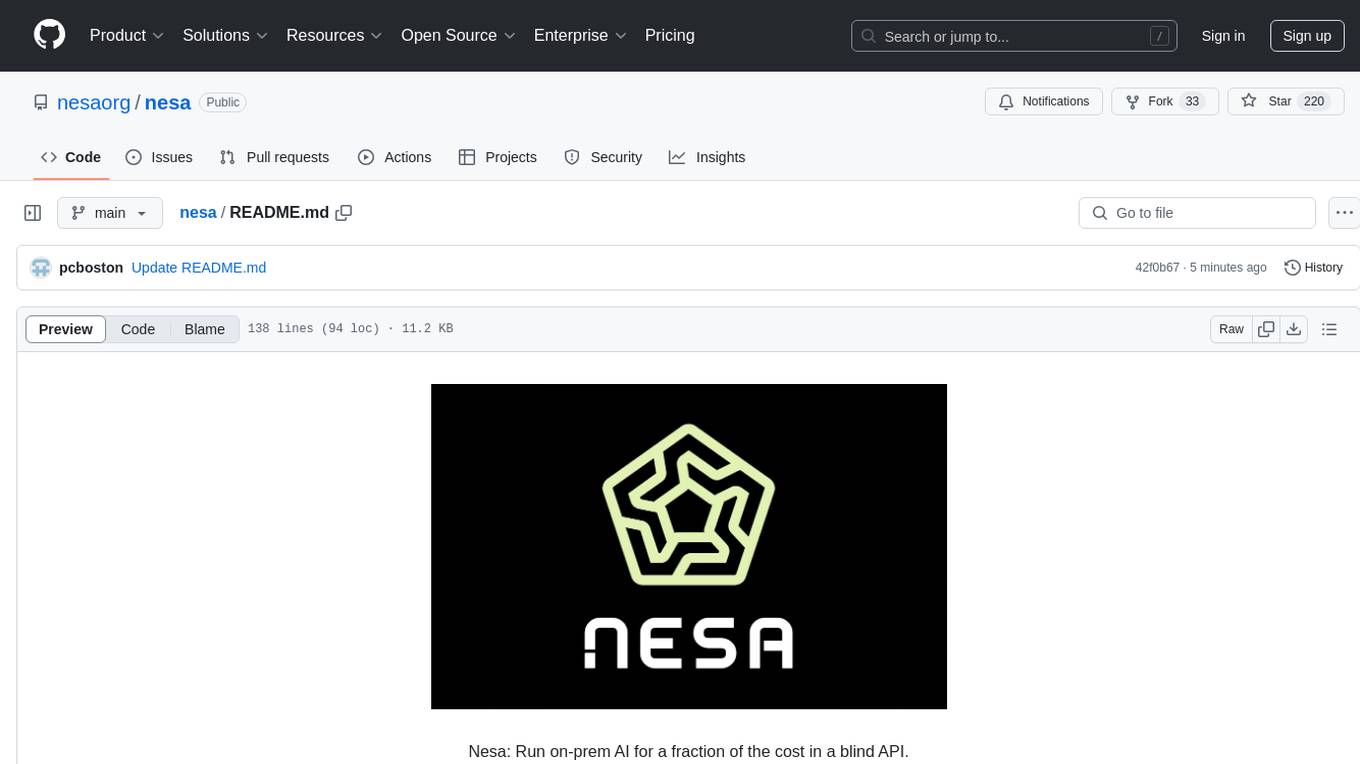
Equivariant-Encryption-for-AI
At Nesa, privacy is a critical objective. Equivariant Encryption (EE) is a solution developed to perform inference on neural networks without exposing input and output data. EE integrates specialized transformations for neural networks, maintaining data privacy while ensuring inference operates correctly on encrypted inputs. It provides the same latency as plaintext inference with no slowdowns and offers strong security guarantees. EE avoids the computational costs of traditional Homomorphic Encryption (HE) by preserving non-linear neural functions. The tool is designed for modern neural architectures, ensuring accuracy, scalability, and compatibility with existing pipelines.
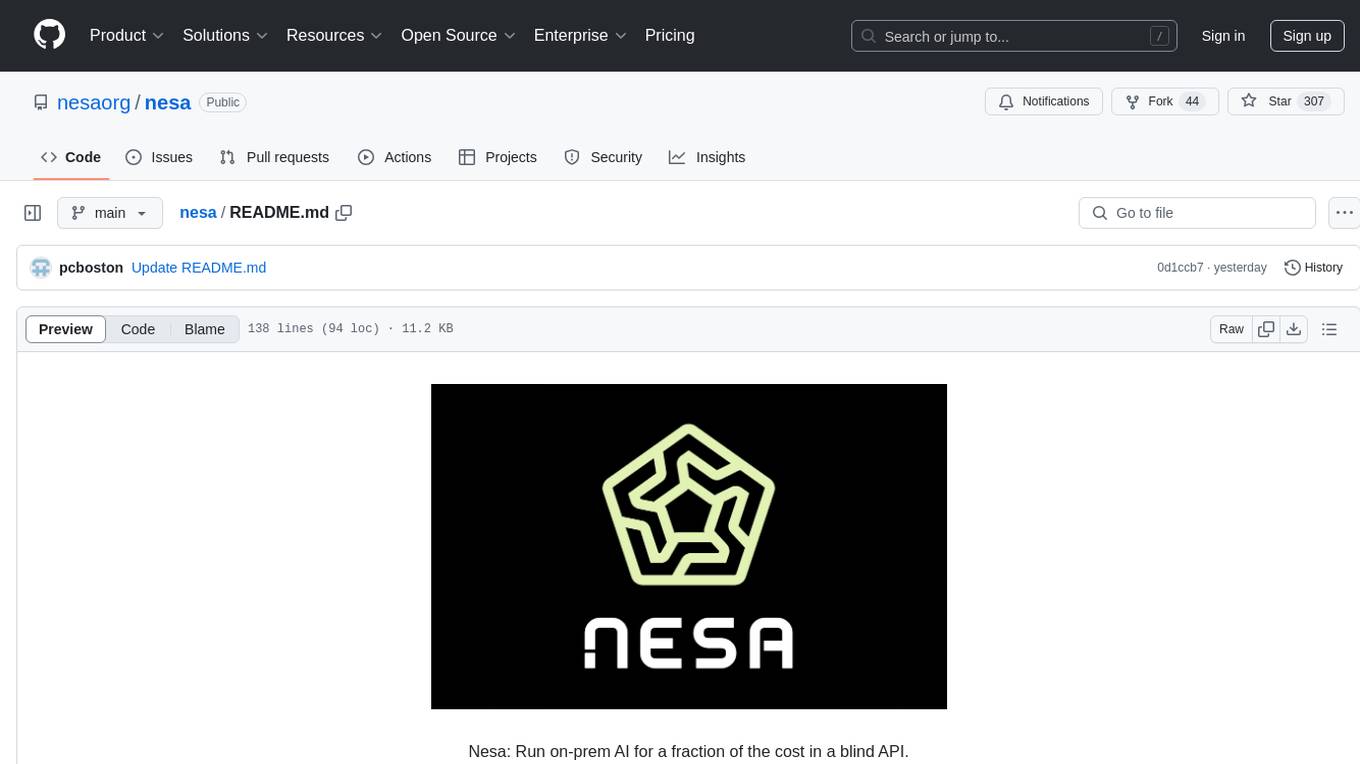
nesa
Nesa is a tool that allows users to run on-prem AI for a fraction of the cost through a blind API. It provides blind privacy, zero latency on protected inference, wide model coverage, cost savings compared to cloud and on-prem AI, RAG support, and ChatGPT compatibility. Nesa achieves blind AI through Equivariant Encryption (EE), a new security technology that provides complete inference encryption with no additional latency. EE allows users to perform inference on neural networks without exposing the underlying data, preserving data privacy and security.

ai-enablement-stack
The AI Enablement Stack is a curated collection of venture-backed companies, tools, and technologies that enable developers to build, deploy, and manage AI applications. It provides a structured view of the AI development ecosystem across five key layers: Agent Consumer Layer, Observability and Governance Layer, Engineering Layer, Intelligence Layer, and Infrastructure Layer. Each layer focuses on specific aspects of AI development, from end-user interaction to model training and deployment. The stack aims to help developers find the right tools for building AI applications faster and more efficiently, assist engineering leaders in making informed decisions about AI infrastructure and tooling, and help organizations understand the AI development landscape to plan technology adoption.
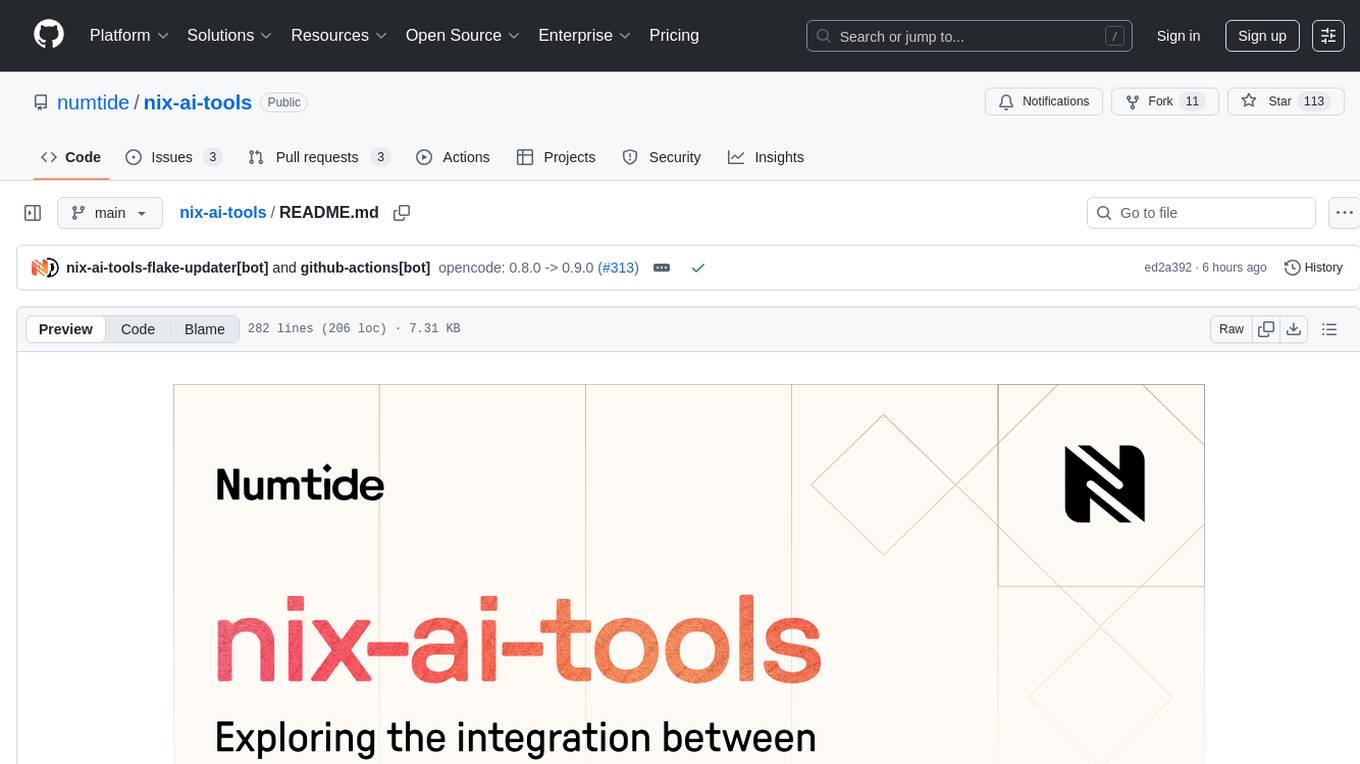
nix-ai-tools
Exploring the integration between Nix and AI coding agents, this repository serves as a testbed for packaging, sandboxing, and enhancing AI-powered development tools within the Nix ecosystem. It provides a collection of AI tools with descriptions, versions, sources, licenses, homepages, and usage instructions. The repository also supports daily updates using GitHub Actions and offers a platform for experimental features like sandboxed execution, provider abstraction, and tool composition in Nix environments. Contributions are welcome, and the Nix packaging code in this repository is licensed under MIT.
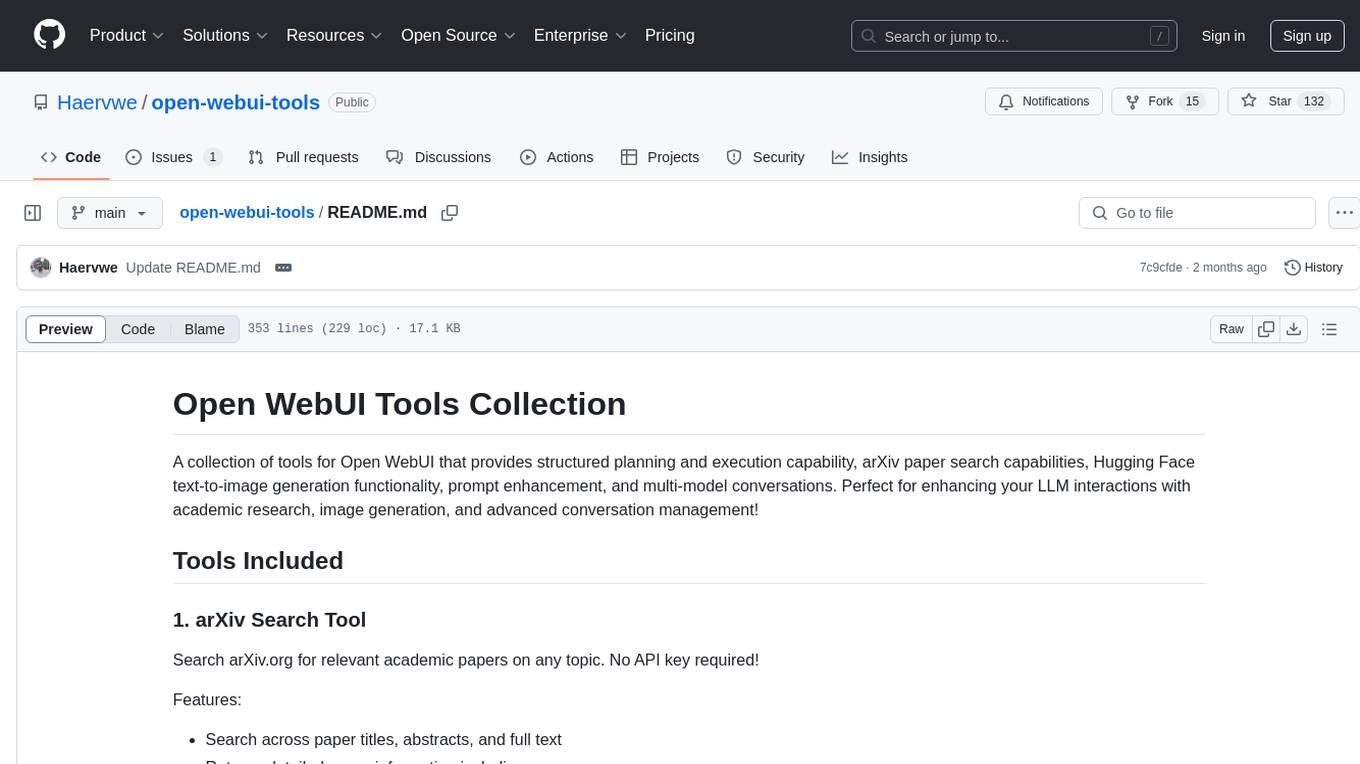
open-webui-tools
Open WebUI Tools Collection is a set of tools for structured planning, arXiv paper search, Hugging Face text-to-image generation, prompt enhancement, and multi-model conversations. It enhances LLM interactions with academic research, image generation, and conversation management. Tools include arXiv Search Tool and Hugging Face Image Generator. Function Pipes like Planner Agent offer autonomous plan generation and execution. Filters like Prompt Enhancer improve prompt quality. Installation and configuration instructions are provided for each tool and pipe.
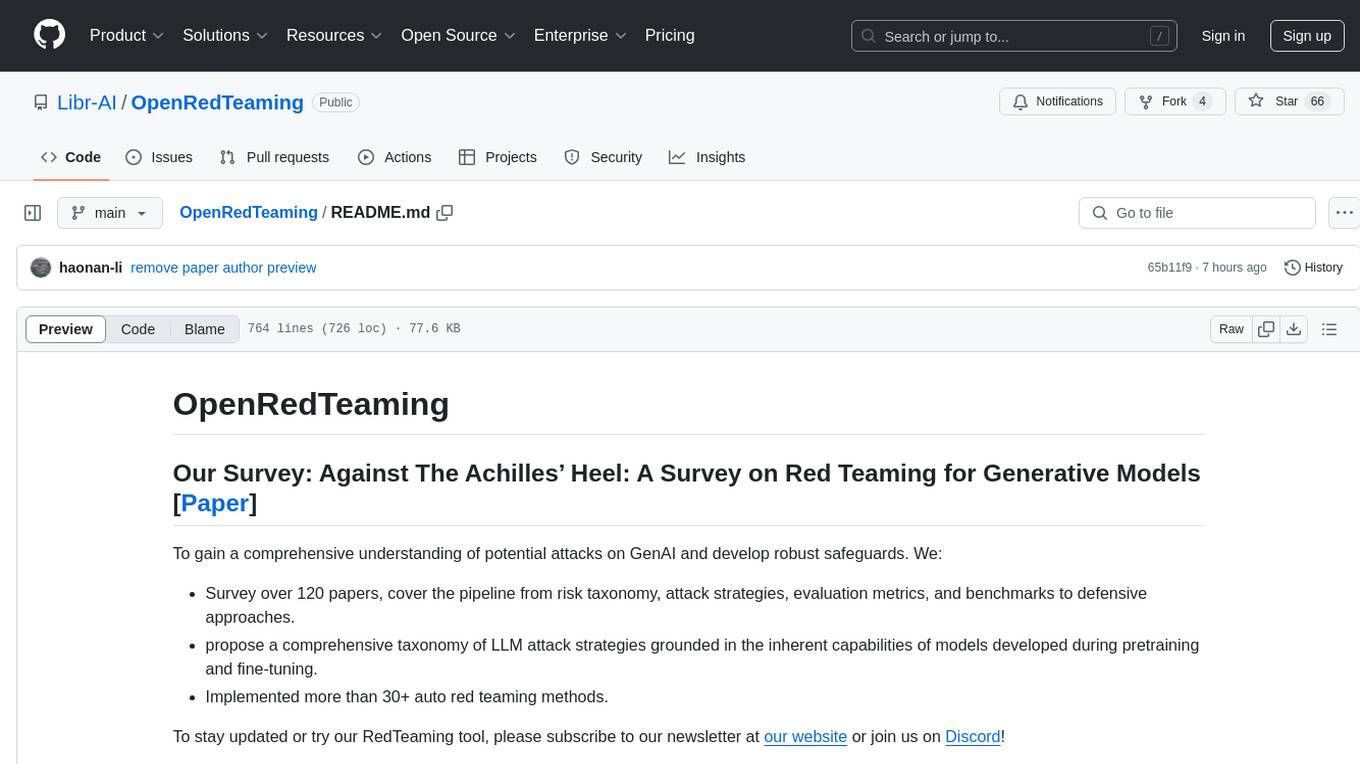
OpenRedTeaming
OpenRedTeaming is a repository focused on red teaming for generative models, specifically large language models (LLMs). The repository provides a comprehensive survey on potential attacks on GenAI and robust safeguards. It covers attack strategies, evaluation metrics, benchmarks, and defensive approaches. The repository also implements over 30 auto red teaming methods. It includes surveys, taxonomies, attack strategies, and risks related to LLMs. The goal is to understand vulnerabilities and develop defenses against adversarial attacks on large language models.
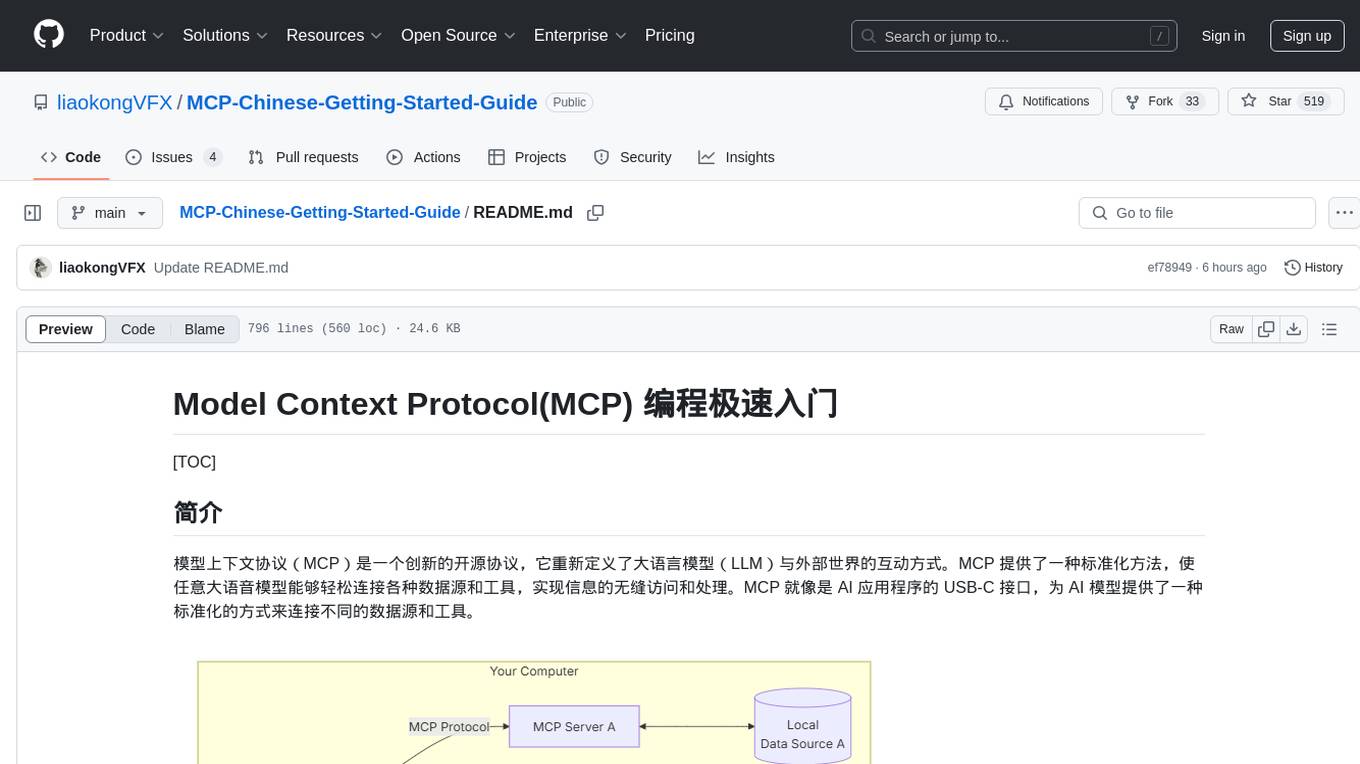
MCP-Chinese-Getting-Started-Guide
The Model Context Protocol (MCP) is an innovative open-source protocol that redefines the interaction between large language models (LLMs) and the external world. MCP provides a standardized approach for any large language model to easily connect to various data sources and tools, enabling seamless access and processing of information. MCP acts as a USB-C interface for AI applications, offering a standardized way for AI models to connect to different data sources and tools. The core functionalities of MCP include Resources, Prompts, Tools, Sampling, Roots, and Transports. This guide focuses on developing an MCP server for network search using Python and uv management. It covers initializing the project, installing dependencies, creating a server, implementing tool execution methods, and running the server. Additionally, it explains how to debug the MCP server using the Inspector tool, how to call tools from the server, and how to connect multiple MCP servers. The guide also introduces the Sampling feature, which allows pre- and post-tool execution operations, and demonstrates how to integrate MCP servers into LangChain for AI applications.
